 11/01/2010 09:35 11/01/2010 09:35 |
|
| | | OFFLINE | | Post: 19.259
Post: 1.901 | Registrato il: 28/08/2005
Registrato il: 20/01/2009 | Administratore | Utente Veteran | |
|


 Benedict XVI offers middle ground
Benedict XVI offers middle ground
on the environment -
but is anyone listening?
By Archbishop Giampaolo Crepaldi
Secretary, Pontifical Council for Justice and Peace
 Mons. Crepaldi is also the president of the Cardinal Van Thuân International Observatory for the Social Doctrine of the Church.
Mons. Crepaldi is also the president of the Cardinal Van Thuân International Observatory for the Social Doctrine of the Church.
VERONA, Italy, JAN. 10, 2010 (Zenit.org) - The 2010 edition of the traditional Papal message for the World Day of Peace, presented last December 15 was much anticipated.
In the countries of north-central Europe, and especially in Germany, Benedict XVI's encyclical Caritas in Veritate was the object of severe criticism, precisely in regard to the question of the environment, and particularly with regard to climate change.
So it was logical to look forward to the message for this year's World Day of Peace dedicated to the theme "If You Want to Cultivate Peace, Protect Creation."
Benedict XVI did not miss the opportunity to restate his teaching and, thus, probably upsetting once again all those who tend to weigh down ideological themes with excessive ideological burdens.
The central point of the message is, in my opinion, a passage from paragraph 13, where the Pope says that "a correct understanding of the relationship between man and the environment will not end by absolutizing nature or by considering it more important than the human person."
The Church, he continues, expresses misgivings "about notions of the environment inspired by ecocentrism and biocentrism," because it eliminates the difference between man and other living things, favoring an "egalitarian vision of the 'dignity' of all living creatures."
This thus gives rise to a new pantheism with neo-pagan accents which "would see the source of man's salvation in nature alone, understood in purely naturalistic terms."
According to the Church, man has "the role of a steward and administrator," a role which he must not abuse nor abdicate. "In the same way, the opposite position, which would absolutize technology and human power, results in a grave assault not only on nature, but also on human dignity itself."
Benedict XVI does not deny that environmental questions have an impact on poverty, nor that they demand a profound rethinking of the model of development, nor that they imply a consideration of the importance of a greater moderation.
But he re-proposes the conviction that if there is not a rethinking of humanity about itself, and if it does not return to see in nature a discourse about us (it is precisely "creation" and not a pile of stones) it will not succeed in acquiring a new moral responsibility even before it works out a new politics.
Both those who do not value material nature and those who respect it more than man as if it were something divine in itself, in the end do not read the message and do not gain wisdom. Fundamentally, both are narrowly technical attitudes.
The problem with the papal messages written for some major world observances, such as the World Day for Peace, is that they are issued weeks, or sometimes months, in advance, so by the time the actual observance comes around, the message is no longer 'news' and hardly even referred to.
That was the case with the World Day for Peace message, which had an ecological theme. It got a few days notice when it was released before Christmas, but on the day itself - zip, nil, nada!
And the main problem with the standard MSM reaction to the Pope's Peace message is that they mostly ignore its explicit central statements as Mons. Crepaldi underscored above. The kneejerk reaction has been to lump Benedict XVI with the politically correct and dominant ideologues of environmentalism by the mere shorthand of labelling him 'green'.
Which is one huge reason to object to MSM calling him 'the green Pope'. It lumps him by connotation with the unthinking one-sided fanatics of the various 'green' movements and the political parties that have formed around them, whose platform would sacrifice legitimate development goals to preserving nature above everything else, including man!
[Modificato da TERESA BENEDETTA 11/01/2010 10:13] |
| |
|
| |
 11/01/2010 12:41 11/01/2010 12:41 |
|
| | | OFFLINE | | Post: 19.260
Post: 1.902 | Registrato il: 28/08/2005
Registrato il: 20/01/2009 | Administratore | Utente Veteran | |
|

 The Pope's window to the world
The Pope's window to the world
by ANGELO SCELZO
Translated from

January 10, 2009
The rhythm of transformation in the new media is accelerating. Cyberspace continues to open new frontiers even as it discards anything that does not point to the future...
And yet, in the first days of this new year, the 'means of communication' that has been most reported on [in both old and new media] has nothing to do with new information technologies.
It is something that has been around a while and has seen much history - the signs of weathering are evident to all.
It is a window on the world, a literal window, that every week captures media attention and strikes a completely different note from the media concert playing the same old stale and predictable scores [In the parlance of IT, one might perhaps call it Window 1.0, the prototype as well as the 'ne plus ultra' of communication windows!]
It is the Pope's third-floor study window in the Apostolic Palace, the window of the Pope's Angelus homilies and messages.
When, every Sunday and major religious feast day, it opens on St. Peter's Square, never take the occasion for granted.
Especially, not with Benedict XVI, who has continued to show, since the first Angelus of this new year, that this rather extraordinary pulpit - which opens equally to the piazza and to the world urbi et orbi, in fact, as Pope's messages go] - will never lack for news, and even surprises.
The Holy Father started 2010 by warning against 'improbable prognostications' and even of 'economic forecasts, as important as they may be' to reiterate that man has to look elsewhere for true hope.
To blot out the 'truth' that can come from some crystal ball or ponderous expert analysis goes against the grain of New Year practices - and so those words from the window were not likely to fall on deaf ears.
And as if to carry on the theme, from one Angelus to the next, Pope Benedict then cites the example of the Magi - those wise men who, for all their expertise in reading the stars as well as their familiarity with the history of peoples, still needed to stop and ask instructions from learned Jews on how best to get to where they would find the newborn 'king of the Jews'.
And from the Pope's window, the message was that true wisdom is intelligence that is open to faith.
Theologians may make dissertations over the separation between faith and culture. Nonetheless, in some way, the Pope's window is also an open book to the world, because in the form of prayer and reflection, the Pope's weekly 'chat' with the faithful is also a chronicle of our day, whose pages are not limited to a religious or ecclesiastical nature.
Among the various forms of communication used by modern Popes, the Angelus is at the same time the most solemn and the most familiar, and its central physical element, the window, has become in some way, the most famous image of the Popes communicating with the faithful and with the rest of the world.
From that opening that directly lies above the majestic embrace of Bernini's colonnade, even silence has spoken, and most sublimely: when John Paul II, a month before he died, tried unsuccessfully to say something to the crowd after he had returned from what would be his last hospitalization.
Somewhat a hearth [an image that recalls Franklin Roosevelt's 'fireside chats'], somewhat a book on world events, the Angelus window always represents the perspective of hope for all mankind.
From the Pope's window, mankind is not a blurred panorama. The faces of men are like an infinite plurality of the one Face of Christ.
Therefore, the view from that window goes far beyond physical space and geography - the Pope's vision is acute, made more so by profundity of spirit.
From that window, the Pope looks across the globe - and this is the perspective that opens not only to those who may find themselves one day in St. Peter's Square looking up to that window, but to all men who, in so many public squares around the world, find it difficult to look upwards at all. Perhaps because they are discouraged in looking for a window that they have been unable to find.
I have been hoping that someone would write a substantial essay on "the Pope's window" - though someone may well have done so already, in all the years I wasn't following papal news at all outside of what I saw on TV or in the newspapers.
The above is not a bad start and is an excellent initiative, but it barely skims the possibilities... BTW, I wasted some time just now unsuccessfully trying to find out online how the practice of the Pope's public Angelus from the window started.
[Modificato da TERESA BENEDETTA 11/01/2010 12:46] |
| |
 11/01/2010 13:06 11/01/2010 13:06 |
|
| | | OFFLINE | | Post: 19.261
Post: 1.903 | Registrato il: 28/08/2005
Registrato il: 20/01/2009 | Administratore | Utente Veteran | |
|
 Monday, January 11
Monday, January 11
Blessed William Carter (England, 1548-1684)
Printer and Martyr
This was a man who was tortured for months, while his wife was hounded to death,
for printing Catholic books and possessing Catholic literature, and then was sentenced
summarily to be hung, drawn and quartered, literally, in the fiercely anti-Catholic
period that followed the establishment of the Church of England. He was specifically
condemnded for publishing a book with a paragraph that expressed confidence
'Catholic hope' would triumph, and a line that 'pious Judith would slay Holofernes',
for which he was accused of incitement to slay the Queen. He was beatified in 1987.
NB: Ironically, for someone who was a printer, I cannot find, through my usual Googling, any image
online for Carter.
Readings for today's Mass: www.usccb.org/nab/readings/011110.shtml
No OR today.
THE POPE'S DAY
The Holy Father's annual state-of-the-world address to the Vatican diplomatic corps.
Delivered in French, the address has been released in the other official languages of
the Vatican. Mainly, he elaborated on the theme of his Message for World Peace Day -
"To cultivate peace, safeguard Creation".
[Modificato da TERESA BENEDETTA 11/01/2010 13:27] |
| |
 11/01/2010 13:20 11/01/2010 13:20 |
|
| | | OFFLINE | | Post: 19.262
Post: 1.904 | Registrato il: 28/08/2005
Registrato il: 20/01/2009 | Administratore | Utente Veteran | |
|
 THE POPE'S ANNUAL ADDRESS
THE POPE'S ANNUAL ADDRESS
TO THE VATICAN DIPLOMATIC CORPS
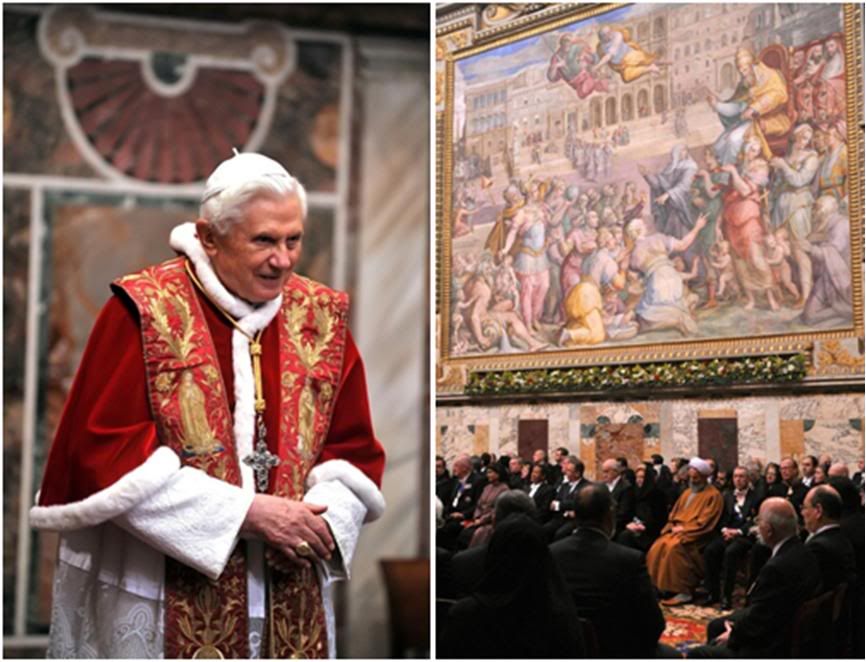
At 11 a.m. today, at the Sala Regia (Throne Room) of the Apostolic Palace, the Holy Father Benedict XVI received the members of the diplomatic corps accredited to the Holy See, for an exchange of New Year greetings.
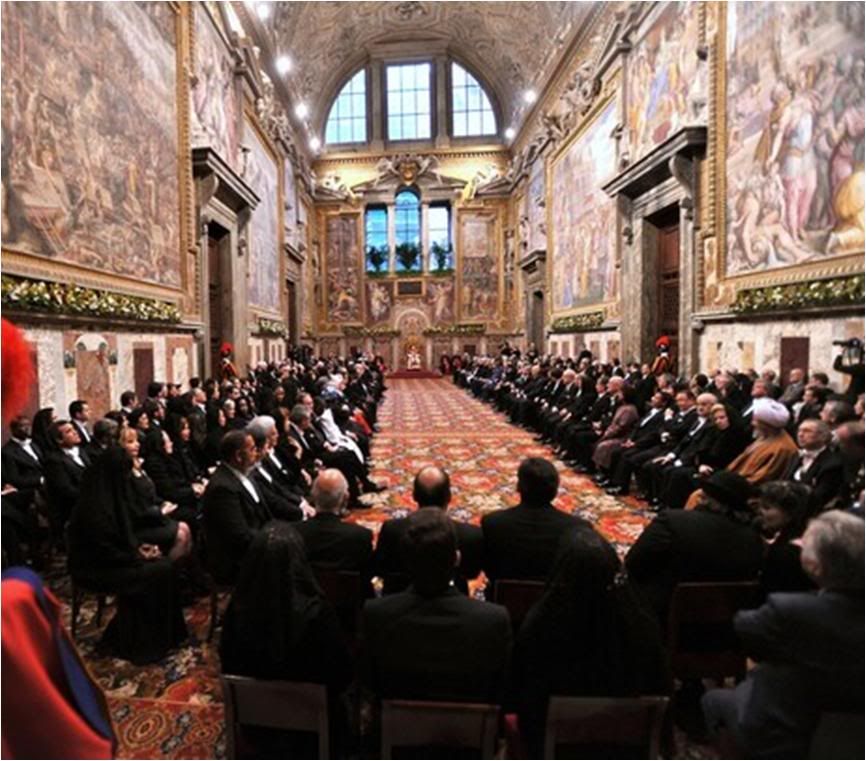
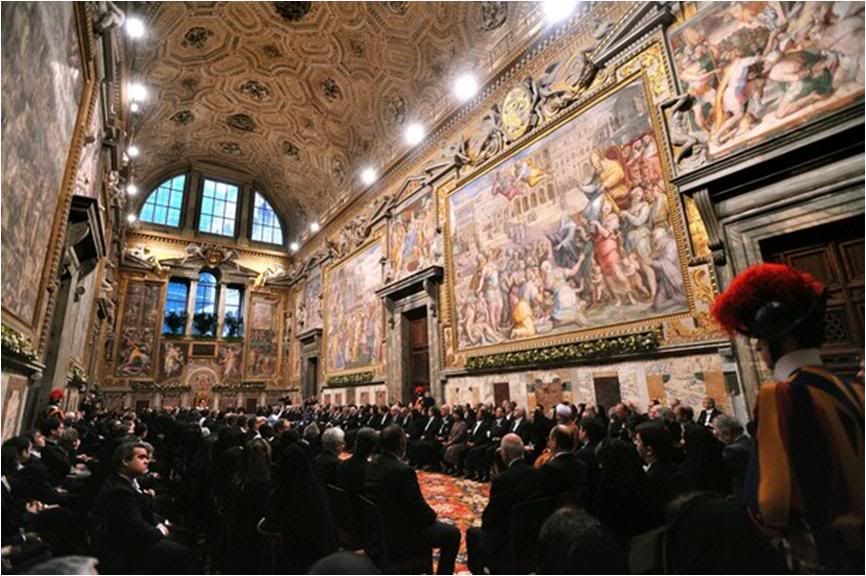
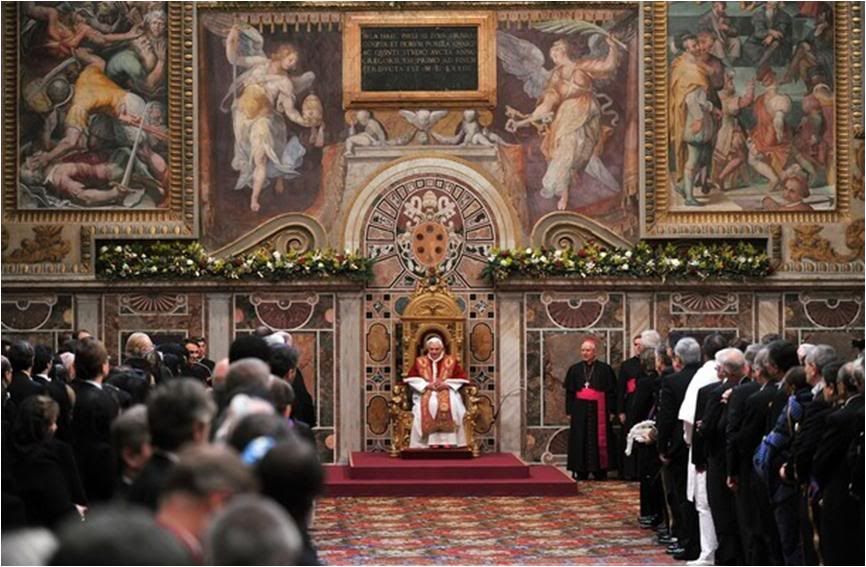
After opening remarks by H.E. Alejandro Emilio Valladares Lanza of Honduras, the Pope delivered the following address in French:
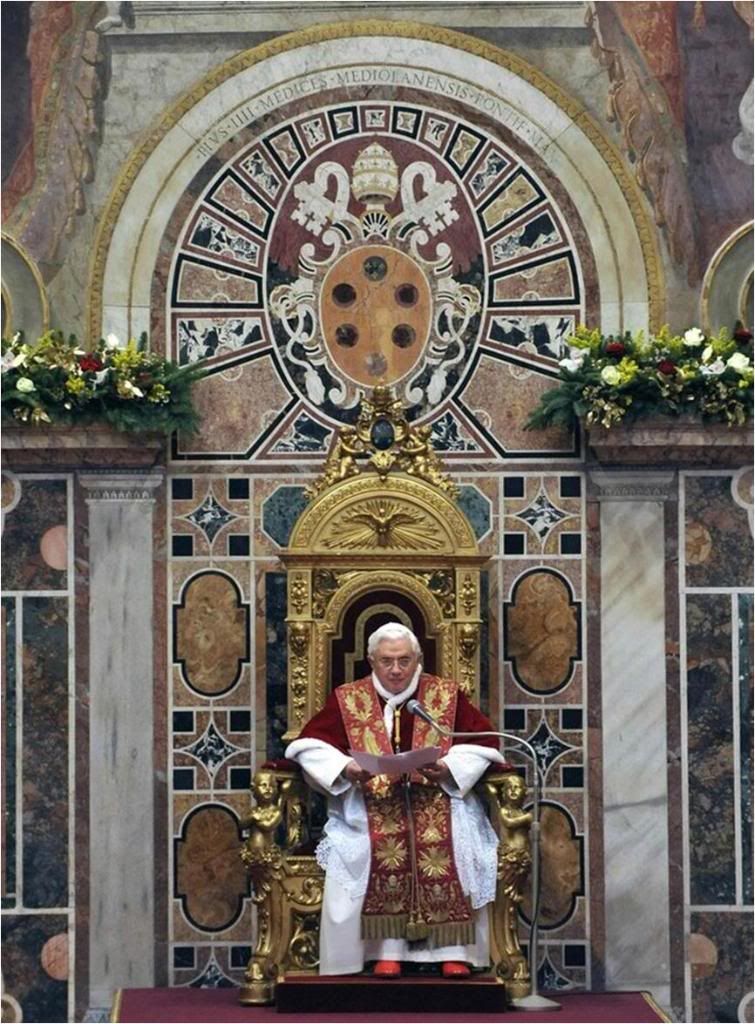
Your Excellencies,
Ladies and Gentlemen,
This traditional meeting at the beginning of the year, two weeks after the celebration of the birth of the Incarnate Word, is a very joyful occasion for me.
As we proclaimed in the liturgy: "We recognize in Christ the revelation of your love. No eye can see his glory as our God, yet now he is seen as one like us. Christ is your Son before all ages, yet now he is born in time. He has come to lift up all things to himself, to restore unity to creation" (Preface of Christmas II).
At Christmas we contemplated the mystery of God and the mystery of creation: by the message of the angels to the shepherds, we received the good news of man’s salvation and the renewal of the entire universe.
That is why, in my Message for the 2010 World Day of Peace, I urged all persons of good will – those same men and women to whom the angels rightly promised peace – to protect creation.
In the same spirit of joy I am happy to greet each of you today, particularly those present for the first time at this ceremony. I thank you most heartily for the good wishes conveyed to me by your Dean, Ambassador Alejandro Valladares Lanza, and I repeat how much I esteem your mission to the Holy See.
Through you I send cordial greetings and good wishes for peace and happiness to the leaders and people of the countries which you worthily represent.
My thoughts also go to all the other nations of the earth: the Successor of Peter keeps his door open to everyone in the hope of maintaining relations which can contribute to the progress of the human family.
It is a cause for deep satisfaction that, just a few weeks ago, full diplomatic relations were established between the Holy See and the Russian Federation. The recent visit of the President of the Socialist Republic of Vietnam was likewise very significant; Vietnam is a country close to my heart, where the Church is celebrating her centuries-long presence by a Jubilee Year.
In this spirit of openness, throughout 2009 I met many political leaders from all over the world; I also visited some of them and would like to continue to do so, insofar as is possible.
The Church is open to everyone because, in God, she lives for others! She thus shares deeply in the fortunes of humanity, which in this new year continues to be marked by the dramatic crisis of the global economy and consequently a serious and widespread social instability.
In my Encyclical Caritas in Veritate, I invited everyone to look to the deeper causes of this situation: in the last analysis, they are to be found in a current self-centred and materialistic way of thinking which fails to acknowledge the limitations inherent in every creature.
Today I would like to stress that the same way of thinking also endangers creation. Each of us could probably cite an example of the damage that this has caused to the environment the world over. I will offer an example, from any number of others, taken from the recent history of Europe.
Twenty years ago, after the fall of the Berlin wall and the collapse of the materialistic and atheistic regimes which had for several decades dominated a part of this continent, WAS IT not easy to assess the great harm which an economic system lacking any reference to the truth about man had done not only to the dignity and freedom of individuals and peoples, but to nature itself, by polluting soil, water and air?
The denial of God distorts the freedom of the human person, yet it also devastates creation. It follows that the protection of creation is not principally a response to an aesthetic need, but much more to a moral need, inasmuch as nature expresses a plan of love and truth which is prior to us and which comes from God.
For this reason I share the growing concern caused by economic and political resistance to combatting the degradation of the environment. This problem was evident even recently, during the XV Session of the Conference of the States Parties to the United Nations Framework Convention on Climate Change held in Copenhagen from 7 to 18 December last.
I trust that in the course of this year, first in Bonn and later in Mexico City, it will be possible to reach an agreement for effectively dealing with this question. The issue is all the more important in that the very future of some nations is at stake, particularly some island states.
It is proper, however, that this concern and commitment for the environment should be situated within the larger framework of the great challenges now facing mankind.
If we wish to build true peace, how can we separate, or even set at odds, the protection of the environment and the protection of human life, including the life of the unborn? It is in man’s respect for himself that his sense of responsibility for creation is shown. As Saint Thomas Aquinas has taught, man represents all that is most noble in the universe (cf. Summa Theologiae, I, q. 29, a. 3).
Furthermore, as I noted during the recent FAO World Summit on Food Security, "the world has enough food for all its inhabitants" (Address of 16 November 2009, No. 2) provided that selfishness does not lead some to hoard the goods which are intended for all.
I would like to stress again that the protection of creation calls for an appropriate management of the natural resources of different countries and, in the first place, of those which are economically disadvantaged.
I think of the continent of Africa, which I had the joy of visiting last March during my journey to Cameroon and Angola, and which was the subject of the deliberations of the recent Special Assembly of the Synod of Bishops.
The Synod Fathers pointed with concern to the erosion and desertification of large tracts of arable land as a result of overexploitation and environmental pollution (cf. Propositio 22). In Africa, as elsewhere, there is a need to make political and economic decisions which ensure "forms of agricultural and industrial production capable of respecting creation and satisfying the primary needs of all" (Message for the 2010 World Day of Peace, No. 10).
How can we forget, for that matter, that the struggle for access to natural resources is one of the causes of a number of conflicts, not least in Africa, as well as a continuing threat elsewhere? For this reason too, I forcefully repeat that to cultivate peace, one must protect creation!
Furthermore, there are still large areas, for example in Afghanistan or in some countries of Latin America, where agriculture is unfortunately still linked to the production of narcotics, and is a not insignificant source of employment and income.
If we want peace, we need to preserve creation by rechanneling these activities; I once more urge the international community not to become resigned to the drug trade and the grave moral and social problems which it creates.
Ladies and Gentlemen, the protection of creation is indeed an important element of peace and justice! Among the many challenges which it presents, one of the most serious is increased military spending and the cost of maintaining and developing nuclear arsenals.
Enormous resources are being consumed for these purposes, when they could be spent on the development of peoples, especially those who are poorest. For this reason I firmly hope that, during the Nuclear Non-Proliferation Treaty Review Conference to be held this May in New York, concrete decisions will be made towards progressive disarmament, with a view to freeing our planet from nuclear arms.
More generally, I deplore the fact that arms production and export helps to perpetuate conflicts and violence, as in Darfur, in Somalia or in the Democratic Republic of the Congo.
Together with the inability of the parties directly involved to step back from the spiral of violence and pain spawned by these conflicts, there is the apparent powerlessness of other countries and the international organizations to restore peace, to say nothing of the indifference, amounting practically to resignation, of public opinion worldwide. There is no need to insist on the extent to which such conflicts damage and degrade the environment.
Finally, how can I fail to mention terrorism, which endangers countless innocent lives and generates widespread anxiety. On this solemn occasion, I would like to renew the appeal which I made during the Angelus prayer of 1 January last to all those belonging to armed groups, of whatever kind, to abandon the path of violence and to open their hearts to the joy of peace.
The grave acts of violence to which I have just alluded, combined with the scourges of poverty, hunger, natural disasters and the destruction of the environment, have helped to swell the ranks of those who migrate from their native land.
Given the extent of this exodus, I wish to exhort the various civil authorities to carry on their work with justice, solidarity and foresight. Here I wish to speak in particular of the Christians of the Middle East. Beleaguered in various ways, even in the exercise of their religious freedom, they are leaving the land of their forebears, where the Church took root during the earliest centuries.
To offer them encouragement and to make them feel the closeness of their brothers and sisters in faith, I have convened for next autumn a Special Assembly of the Synod of Bishops on the Middle East.
Ladies and Gentlemen, to this point I have alluded only to a few aspects of the problem of the environment. Yet the causes of the situation which is now evident to everyone are of the moral order, and the question must be faced within the framework of a great programme of education aimed at promoting an effective change of thinking and at creating new lifestyles.
The community of believers can and wants to take part in this, but, for it to do so, its public role must be recognized. Sadly, in certain countries, mainly in the West, one increasingly encounters in political and cultural circles, as well in the media, scarce respect and at times hostility, if not scorn, directed towards religion and towards Christianity in particular.
It is clear that if relativism is considered an essential element of democracy, one risks viewing secularity solely in the sense of excluding or, more precisely, denying the social importance of religion.
But such an approach creates confrontation and division, disturbs peace, harms human ecology and, by rejecting in principle approaches other than its own, finishes in a dead end. There is thus an urgent need to delineate a positive and open secularity which, grounded in the just autonomy of the temporal order and the spiritual order, can foster healthy cooperation and a spirit of shared responsibility.
Here I think of Europe, which, now that the Lisbon Treaty has taken effect, has entered a new phase in its process of integration, a process which the Holy See will continue to follow with close attention.
Noting with satisfaction that the Treaty provides for the European Union to maintain an "open, transparent and regular" dialogue with the Churches (Art. 17), I express my hope that in building its future, Europe will always draw upon the wellsprings of its Christian identity.
As I said during my Apostolic Visit last September to the Czech Republic, Europe has an irreplaceable role to play "for the formation of the conscience of each generation and the promotion of a basic ethical consensus that serves every person who calls this continent ‘home’ " (Meeting with Political and Civil Authorities and with the Diplomatic Corps, 26 September 2009).
To carry our reflection further, we must remember that the problem of the environment is complex; one might compare it to a multifaceted prism. Creatures differ from one another and can be protected, or endangered, in different ways, as we know from daily experience.
One such attack comes from laws or proposals which, in the name of fighting discrimination, strike at the biological basis of the difference between the sexes. I am thinking, for example, of certain countries in Europe or North and South America.
Saint Columban stated that: "If you take away freedom, you take away dignity" (Ep. 4 ad Attela, in S. Columbani Opera, Dublin, 1957, p. 34). Yet freedom cannot be absolute, since man is not himself God, but the image of God, God’s creation. For man, the path to be taken cannot be determined by caprice or willfulness, but must rather correspond to the structure willed by the Creator.
The protection of creation also entails other challenges, which can only be met by international solidarity. I think of the natural disasters which this past year have sown death, suffering and destruction in the Philippines, Vietnam, Laos, Cambodia and Taiwan. Nor can I pass over Indonesia and, closer to us, the Abruzzi region, hit by devastating earthquakes.
Faced with events like these, generous aid should never be lacking, since the life itself of God’s children is at stake. Yet, in addition to solidarity, the protection of creation also calls for concord and stability between states.
Whenever disagreements and conflicts arise among them, in order to defend peace they must tenaciously pursue the path of constructive dialogue. This is what happened twenty-five years ago with the Treaty of Peace and Friendship between Argentina and Chile, reached thanks to the mediation of the Apostolic See.
That Treaty has borne abundant fruit in cooperation and prosperity which have in some way benefited all of Latin America. In this same area of the world, I am pleased by the rapprochement upon which Columbia and Ecuador have embarked after several months of tension.
Closer to us, I am gratified by the agreement concluded between Croatia and Slovenia on arbitration regarding their sea and land borders. I am also pleased by the accord between Armenia and Turkey for the re-establishment of diplomatic relations, and I express my hope that, through dialogue, relations will improve among all the countries of the southern Caucasus.
In the course of my pilgrimage to the Holy Land, I urgently appealed to the Israelis and the Palestinians to dialogue and to respect each others’ rights.
Once again I call for a universal recognition of the right of the State of Israel to exist and to enjoy peace and security within internationally recognized borders. Likewise, the right of the Palestinian people to a sovereign and independent homeland, to live in dignity and to enjoy freedom of movement, ought to be recognized.
I would also like to request the support of everyone for the protection of the identity and sacred character of Jerusalem, and of its cultural and religious heritage, which is of universal value. Only thus will this unique city, holy yet deeply afflicted, be a sign and harbinger of that peace which God desires for the whole human family.
Out of love for the dialogue and peace which protect creation, I exhort the government leaders and the citizens of Iraq to overcome their divisions and the temptation to violence and intolerance, in order to build together the future of their country.
The Christian communities also wish to make their own contribution, but if this is to happen, they need to be assured respect, security and freedom. Pakistan has been also hard hit by violence in recent months and certain episodes were directly aimed at the Christian minority.
I ask that everything be done to avoid the recurrence of such acts of aggression, and to ensure that Christians feel fully a part of the life of their country.
In speaking of acts of violence against Christians, I cannot fail to mention also the deplorable attack which the Egyptian Coptic community suffered in recent days, during its celebration of Christmas.
Concerning Iran, I express my hope that through dialogue and cooperation joint solutions will be found on the national as well as the international level.
I encourage Lebanon, which has emerged from a lengthy political crisis, to continue along the path of concord.
I hope that Honduras, after a period of uncertainty and unrest, will move towards a recovery of normal political and social life. I desire the same for Guinea and Madagascar with the effective and disinterested aid of the international community.
Ladies and Gentlemen, at the end of this rapid overview which, due to its brevity, cannot mention every situation worthy of note, I am reminded of the words of the Apostle Paul, for whom "all creation groans and is in agony" and "we ourselves groan inwardly" (Rom 8:20-23).
There is so much suffering in our world, and human selfishness continues in many ways to harm creation. For this reason, the yearning for salvation which affects all creation is that much more intense and present in the hearts of all men and women, believers and non-believers alike.
The Church points out that the response to this aspiration is Christ "the firstborn of all creation, for in him all things in heaven and on earth were created" (Col 1:15-16). Looking to him, I exhort every person of good will to work confidently and generously for the sake of human dignity and freedom.
May the light and strength of Jesus help us to respect human ecology, in the knowledge that natural ecology will likewise benefit, since the book of nature is one and indivisible. In this way we will be able to build peace, today and for the sake of generations to come. To all I wish a Happy New Year!
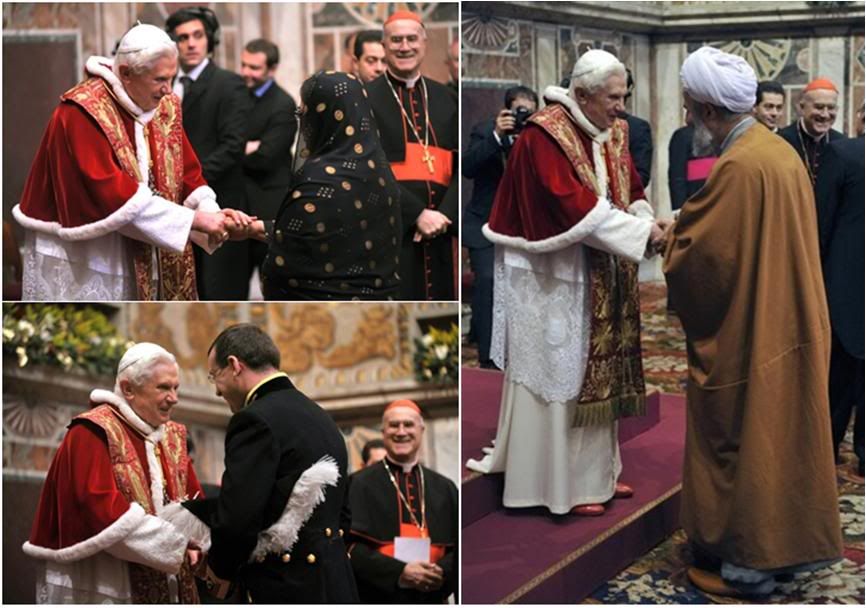
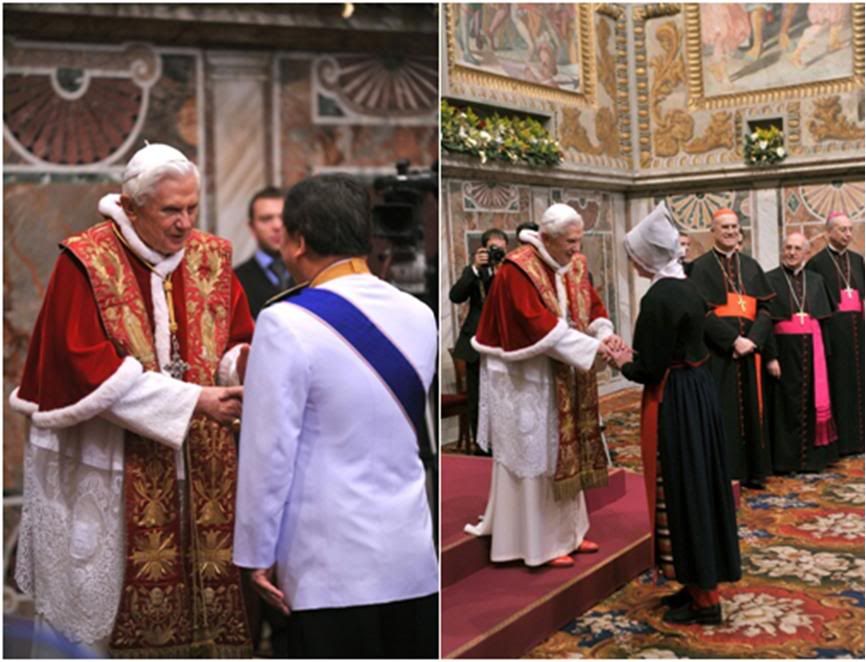
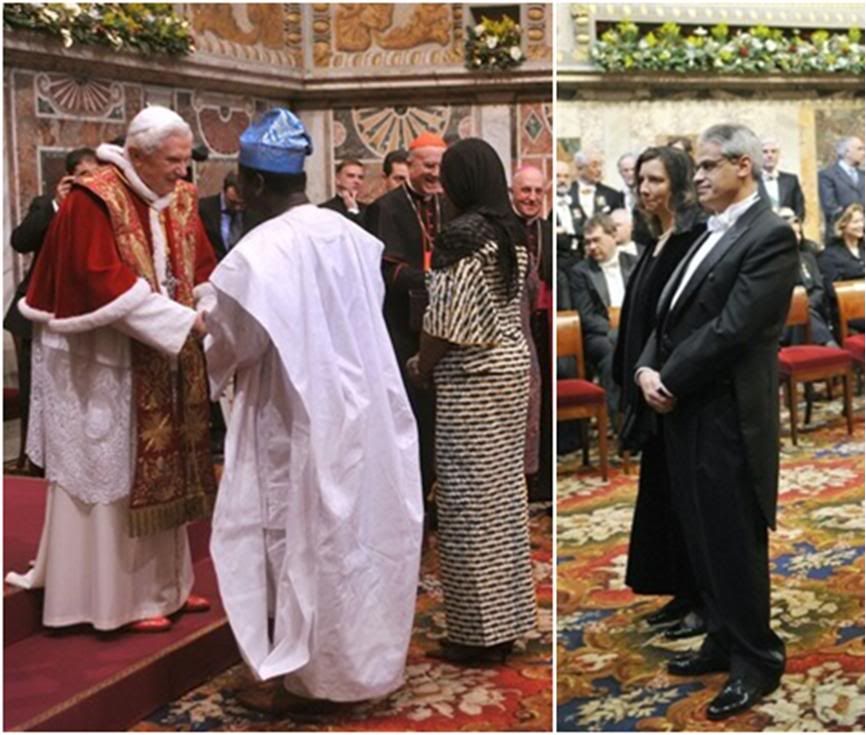
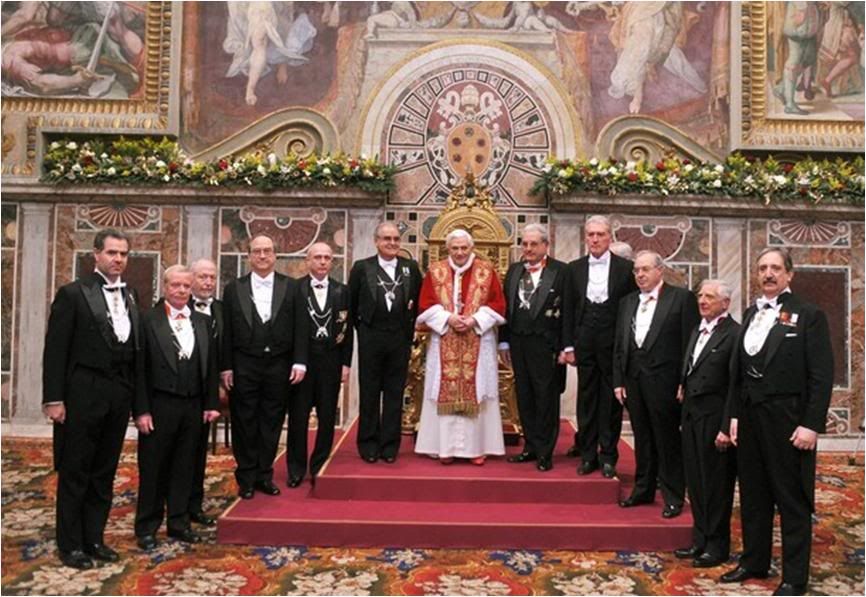
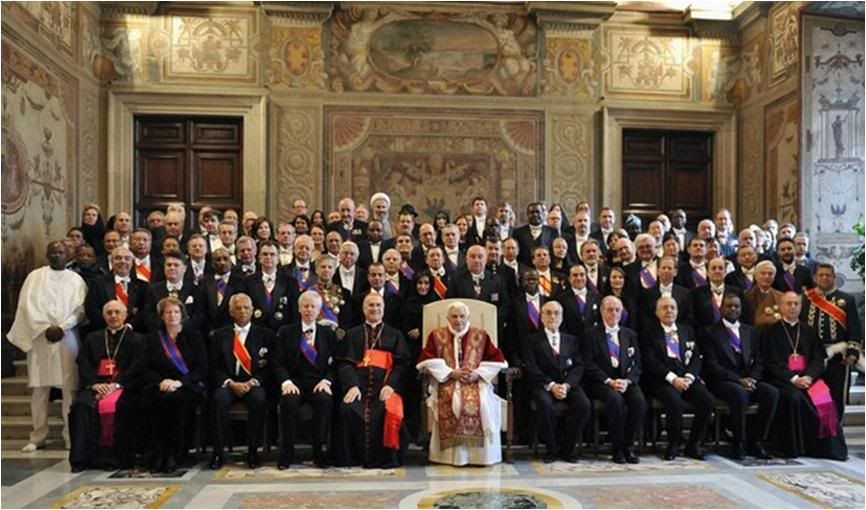 VATICAN DIPLOMATIC TIES
VATICAN DIPLOMATIC TIES
AT A GLANCE
Translated from

On December 9, 2009. the Holy See established full diplomatic relations with the Russian Federation, at the level of an Apostolic Nunciature on the part of the Holy See, and an Embassy for the Russians.
There are now 178 States who have full diplomatic relations with the Vatican, in addition to the European Union and the Sovereign Military Order of Malta, as well as the Palestinian Liberation Organization.
In terms of international organizations, the Holy See is in the United Nations as an Observer State, and is a member of seven organizations or systems within the UN system; an observer in another eight UN agencies; and a member or observer in five regional organizations, including the Arab League.
On January 12, 2009, an agreement was signed between the Holy See and teh federal state of Schleswig-Hosltein in Germany to regulate the juridical status of the Catholic Church in that state.
On March 5, 2009, a Sixth Additional Agreement was signed to the Convention between the Holy See and Austria for the regulation of their patrimonial relationships.
On Dec. 10, 2009, there was an exhcange of ratified documents on an Agreement with Brazil signed in November 2008.
Finally, on Dec. 17, a monetary convention was signed between the State of Vatican City and the European Union which took force immediately.
 How the news agencies
How the news agencies
reported the Pope's address
I am learning not to necessarily post various accounts of the Pope's major addresses and messages, because they are generally very incomplete anyway and tendentiously selective, with each reporter choosing what he/she wants to focus on. So here is a sampling of the headlines for the news agency reports today:
AP - Pope denounces failure to forge new climate treaty
BBC- Pope lambasts Copenhagen failure
dpa - Pope laments scorn of religion in the West
Bloomberg - Pope skeptical on recovery, predicts more 'dramatic' crisis
CNS - Selfishness, lack of respect for life lead to destruction
CNA - Relativism must not be allowed to deny religion's importance
And once again, Reuters which caused a minor ruckus with last year's Curial address by claiming that the Pope "had likened saving mankind from homosexuals to saving the rain forests" - as absurd and improbable as that statement sounds - does it again with this headline immediately picked up by all the gay sites on line:
Reuters - Pope says gay marriage a threat to creation
What 's with Philip Pullella's gay fixation, anyway?
You can compare the headlines with what the Pope actually said.
[Modificato da TERESA BENEDETTA 12/01/2010 03:44] |
| |
 11/01/2010 15:21 11/01/2010 15:21 |
|
| | | OFFLINE | | Post: 19.263
Post: 1.905 | Registrato il: 28/08/2005
Registrato il: 20/01/2009 | Administratore | Utente Veteran | |
|

 Holy Land prelates will accompany
Holy Land prelates will accompany
Benedict XVI to the Rome Synagogue

JERUSALEM, Jan. 12 (SIR) - “The Catholics of the Holy Land, too, will be with Benedict XVI on his visit to Rome’s Synagogue” on Sunday, January 17th, the Latin Patriarch of Jerusalem, Mons. Fouad Twal, told SIR today, after a meeting with US and European Union bishops visiting the Holy Land till Jan. 14.
Patriarch Twal, representing the Catholic community of the Holy Land; Mons. Antonio Franco, Apostolic Nuncio in the Holy Land; and Mons. Giacinto Boulos Marcuzzo, the Patriarch's vicar for Galilee, will accompany the Pope on this historic visit.
"I hope this visit will help our inter-religious relations. It is a gesture we make with the heart to show our respect for the Israeli community as well. Hopefully, this gesture will have a positive impact on Israeli public opinion and in Jerusalem”, the patriarch said.
Father David Neuhaus, patriarchal vicar for the Hebrew-speaking Catholic communities said: "This visit is very symbolic, even if Jews and Catholics may not be accustomed yet to such visits. It is significant that the Patriarch and the Nuncio will be with the Pope, because it means that the Church of the Holy Land is part of the universal Church, which has great concern for the fate of the Middle Eastern Christian communities. Such a visit might help, with time, to change the mentality of the future generations”.
A very thoughtful move on the part of the Pope. This gives the visit more symbolic significance beyond what it means for the Church in Rome and for the Vatican.
[Modificato da TERESA BENEDETTA 11/01/2010 15:25] |
| |
 12/01/2010 12:07 12/01/2010 12:07 |
|
| | | OFFLINE | | Post: 19.265
Post: 1.907 | Registrato il: 28/08/2005
Registrato il: 20/01/2009 | Administratore | Utente Veteran | |
|

 Sandro Magister always has the good sense to quote Pope Benedict directly and liberally to call attention to the Pope's words. Here is what he thought to be the key points in the Pope's address to the Vatican diplomatic corps yesterday:
Benedict XVI to the diplomats:
Sandro Magister always has the good sense to quote Pope Benedict directly and liberally to call attention to the Pope's words. Here is what he thought to be the key points in the Pope's address to the Vatican diplomatic corps yesterday:
Benedict XVI to the diplomats:
Three levers to lift the world
An ecology of nature but above all of man, positive secularity, freedom of religion.
The salient points of the pope's annual speech to representatives of states.

ROME, January 11, 2010 – As at the beginning of every year, Pope Benedict XVI delivered his state of the world address this morning to the diplomatic corps accredited to the Holy See.
The address was in the prudent style of Vatican diplomacy. For example, it does not mention India or China, the two emerging superpowers where the Catholic Church is for various reasons oppressed and attacked.
However, this does not change the fact that the address transmits messages that intentionally go against the mainstream. Three of them in particular.
1. ECOLOGY OF NATURE, BUT ABOVE ALL OF MAN
The first message coincides with the one previously issued by Benedict XVI for the World Day of Peace, celebrated on New Year's Day: "If you want to cultivate peace, protect creation." With a decisive and unconventional emphasis: the primacy that must be given to the comprehensive safeguarding of man.
Here are three passages from the address that develop this theme:
Twenty years ago, after the fall of the Berlin wall and the collapse of the materialistic and atheistic regimes which had for several decades dominated a part of this continent, it was easy to assess the great harm which an economic system lacking any reference to the truth about man had done not only to the dignity and freedom of individuals and peoples, but to nature itself, by polluting soil, water and air.
The denial of God distorts the freedom of the human person, yet it also devastates creation. It follows that the protection of creation is not principally a response to an aesthetic need, but much more to a moral need, in as much as nature expresses a plan of love and truth which is prior to us and which comes from God." [...]
If we wish to build true peace, how can we separate, or even set at odds, the protection of the environment and the protection of human life, including the life of the unborn? It is in man’s respect for himself that his sense of responsibility for creation is shown. [...]
Creatures differ from one another and can be protected, or endangered, in different ways, as we know from daily experience. One such attack comes from laws or proposals which, in the name of fighting discrimination, strike at the biological basis of the difference between the sexes. I am thinking, for example, of certain countries in Europe or North and South America.
Saint Columban stated that: 'If you take away freedom, you take away dignity.' Yet freedom cannot be absolute, since man is not himself God, but the image of God, God’s creation. For man, the path to be taken cannot be determined by caprice or willfulness, but must rather correspond to the structure willed by the Creator.
2. POSITIVE SECULARITY
A second unconventional message is addressed mainly to Europe and the West. It defends the public role of the Church. In this sense:
The causes of the situation which is now evident to everyone are of the moral order, and the question must be faced within the framework of a great programme of education aimed at promoting an effective change of thinking and at creating new lifestyles.
The community of believers can and wants to take part in this, but, for it to do so, its public role must be recognized. Sadly, in certain countries, mainly in the West, one increasingly encounters in political and cultural circles, as well in the media, scarce respect and at times hostility, if not scorn, directed towards religion and towards Christianity in particular.
It is clear that if relativism is considered an essential element of democracy, one risks viewing secularity solely in the sense of excluding or, more precisely, denying the social importance of religion. But such an approach creates confrontation and division, disturbs peace, harms human ecology and, by rejecting in principle approaches other than its own, finishes in a dead end.
There is thus an urgent need to delineate a positive and open secularity which, grounded in the just autonomy of the temporal order and the spiritual order, can foster healthy cooperation and a spirit of shared responsibility.
Here I think of Europe, which, now that the Lisbon Treaty has taken effect, has entered a new phase in its process of integration, a process which the Holy See will continue to follow with close attention.
Noting with satisfaction that the Treaty provides for the European Union to maintain an 'open, transparent and regular' dialogue with the Churches (Art. 17), I express my hope that in building its future, Europe will always draw upon the wellsprings of its Christian identity.
3. FREEDOM OF RELIGION
Finally, a third message defends freedom of religion, and denounces situations in which this freedom is violated.
Benedict XVI cites some of the examples that see Christians as the victims: Iraq, Pakistan, Egypt, Middle East. He doesn't mention Islam, but in all of the cases cited the aggressors are Muslims:
Out of love for the dialogue and peace which protect creation, I exhort the government leaders and the citizens of Iraq to overcome their divisions and the temptation to violence and intolerance, in order to build together the future of their country.
The Christian communities also wish to make their own contribution, but if this is to happen, they need to be assured respect, security and freedom. Pakistan has been also hard hit by violence in recent months and certain episodes were directly aimed at the Christian minority.
I ask that everything be done to avoid the recurrence of such acts of aggression, and to ensure that Christians feel fully a part of the life of their country.
In speaking of acts of violence against Christians, I cannot fail to mention also the deplorable attack which the Egyptian Coptic community suffered in recent days, during its celebration of Christmas. [...]
The grave acts of violence to which I have just alluded, combined with the scourges of poverty, hunger, natural disasters and the destruction of the environment, have helped to swell the ranks of those who migrate from their native land.
Given the extent of this exodus, I wish to exhort the various civil authorities to carry on their work with justice, solidarity and foresight.
Here I wish to speak in particular of the Christians of the Middle East. Beleaguered in various ways, even in the exercise of their religious freedom, they are leaving the land of their forebears, where the Church took root during the earliest centuries.
To offer them encouragement and to make them feel the closeness of their brothers and sisters in faith, I have convened for next autumn a Special Assembly of the Synod of Bishops on the Middle East.
Here's the editorial in today's L'Osservatore Romano on the Pope's 'state-of-the-world' address.
In God, the Church
lives for others
Editorial
by Giovanni Maria Vian
Translated from
the 1/11-1/12/10 issue of

Benedict XVI's address to the diplomats accredited to the Holy See looks to the future. With a breadth of vision that is generally not found among international leaders, and with a realism that does not hide problems.
In a review that is traditional in form but very well demonstrates the attention and attitude of the Bishop of Rome towards the world, the Pope says in his introductio, that "the Church is open to all because in God, it lives for others".
This opening was demonstrated in the past weeks by the establishment of full diplomatic relations between the Holy See and the Russian Federation - reason for 'profound satisfaction', the Pope said - and by the visit of the President of Vietnam, added to the numerous meetings the Pontiff has held with the world's political representatives at the Vatican and during his travels.
Still in the forefront of the international panorama is the tragic crisis in the world economy and the resulting social instability.
At the root of the crisis - as one reads in Caritas in Veritate - is selfish and materialistic mentality. Whose effects threaten Creation itself - such as the environmental degradation, brought to light after the fall of the Berlin Wall, in the European countries that had been under atheist regimes.
That is why the Holy See shares the strong concern over the substantial failure of the Copenhagen conference on climate change, and hopes that follow-up meetings in Bonn and Mexico City will be able to overcome political and economic resistance to positive measures against environmental degradation. Otherwise, the very fate of some countries is at stake, the Pope declared.
For more reason, the Church - while attentive to the protection of the environment - insists on the irrenunciable respect for the human person, which means protection of life from conception, and an equitable distribution of food resources, of which the world has enough for its entire population, as the Holy See has repeated over the decades against the advocates of catastrophism [with increasing population].
Thus Benedict XVI once again expressed his concern over the exploitation of enormous zones of Africa, drug production in Afghanistan and some nations of Latin America, but above all, the constant increase in military spending and for nuclear arms, which will be the subject of a UN conference in New York this May.
Many insupportable situations due to the spread of violence, poverty and hunger are at the origin of the evident phenomenon of migration worldwide, in the face of which the Pope also appealed once more to civilian authorities to act with "justice, solidarity and foresight" - recalling in particular the forced migration of Christians from their historic homelands in the Middle East.
It is precisely this tragic and preoccupying phenomenon - which risks the extinction of the Christian presence in the lands where the Church was born - that prompted Benedict XVI to call a special assembly of the Bishops' Synod in the autumn.
He also reiterated his advocacy of universal recognition of the rights to statehood of Israelis and Palestinians, as well as the unique identity and character of the city of Jerusalem.
The crises of the world and of individual societies begin in the hearts of men, the Pope reiterated - and they can be overcome by a change in mentality and lifestyles through massive educational efforts.
The Church wishes to be part of such efforts, and therefore, its public role should be acknowledged - in Europe which should not abandon the sources of its own identity, and in the world.
Where the Church does not seek privileges, but only to be allowed to live for others, faithful to its only Lord.
[Modificato da TERESA BENEDETTA 12/01/2010 13:47] |
| |
 12/01/2010 13:00 12/01/2010 13:00 |
|
| | | OFFLINE | | Post: 19.266
Post: 1.907 | Registrato il: 28/08/2005
Registrato il: 20/01/2009 | Administratore | Utente Veteran | |
|
 Tuesday, January 12
Tuesday, January 12
 ST. MARGUERITE BOUGEOYS (b France 1620, d Canada 1700)
ST. MARGUERITE BOUGEOYS (b France 1620, d Canada 1700)
Missionary and Foundress, Congregation of Notre Dame sisters
Canada's first woman saint migrated in 1653 from France, where she had been turned down by
two nuns' congregations, to start a school in the then new colony of Ville Marie (present
Montreal). She would go back three times to France to recruit more missionary helpers
dedicated to the needs of children and women, French as well as Indian. She established
the order in 1676 but its Rules were not approved till 1698. At 69, she walked from Montreal
to Quebec when the bishop asked her to establish a school there. By the time she died, she
was known as 'mother of the colony'. She was canonized in 1982.
OR for 1/22-1/12/10:
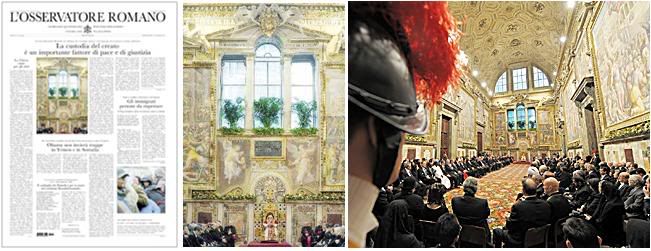
Benedict XVI to the diplomats accredited to the Vatican:
'Violating the dignity of man is a wound to creation'
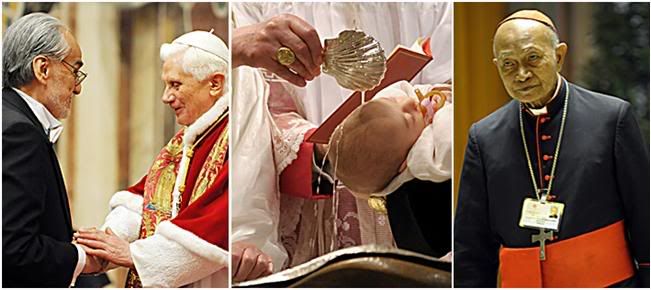 Other papal stories in this double issue: coverage and papal texts from the Mass of the Baptism of Our Lord on
Other papal stories in this double issue: coverage and papal texts from the Mass of the Baptism of Our Lord on
Sunday and the subsequent Angelus, and the Pope's visit Saturday evening to Cardinal Etchegaray in a Rome
hospital; am editorial on the Pope's address to the diplomatic corps; the Pope's message of condolence on the
death last Jan. 9 of Cardinal Armand Gaetan Razafindratandra, 85, Madagascar's first and only cardinal so far.
The cardinal retired as Archbishop of Antananarivo in 2005. The only other Page 1 story: Obama says he is not
sending US troops to fight in Yemen and Somalia.
No events scheduled for the Holy Father today.
Pope mourns death of
Madagascar cardinal
Translated from

Cardinal Armand Gaétan Razafindratandra, emeritus Archbishop of Antananarivo (Madagascar, formally
the Republic of Malagasy), died Saturday, Jan. 9, at the age of 85.
The Holy Father sent the following telegram of condolence to the present Archbishop, Mons. Odon Marie
Arsène Razanakolona. The telegram is in French:
H.E. MGR ODON MARIE ARSÈNE RAZANAKOLONA
ARCHBISHOP OF ANTANANARIVO
Having learned that your predecessor, Cardinal Armand Gaetan Razafindratandra, has been called
back to God, I express my profound union in prayer with the Archdiocese of Antananarivo, with
the family of the deceased and with all the persons affected by this loss.
Entrusting him to the mercy of the Lord, I thank God for the ministry of this ardent Pastor who spent
all his life in the service of the Malagasians, as a diocesan priest, then as Archbishop of Antananarivo,
giving the best of himself so that Christ could be announced.
With the maternal intercession of the Virgin Mary, Queen of Africa, may the Lord welcome his faithful
servant to his Kingdom of peace and light!
To you, to your diocesan faithful, and to the archbishop's family and friends, and to all those who will
gather for the funeral rites, I impart from my heart the Apostolic Blessing.
BENEDICTUS PP XVI
[Modificato da TERESA BENEDETTA 12/01/2010 18:57] |
| |
 12/01/2010 15:03 12/01/2010 15:03 |
|
| | | OFFLINE | | Post: 19.267
Post: 1.909 | Registrato il: 28/08/2005
Registrato il: 20/01/2009 | Administratore | Utente Veteran | |
|
 Here's another article flagged by Beatrice on her site
Here's another article flagged by Beatrice on her site
 http://benoit-et-moi.fr/
Emerging from the ‘relativist’ fog
http://benoit-et-moi.fr/
Emerging from the ‘relativist’ fog
By Denis Tillinac
Translated from

January 7, 2010
At the time the Pope Benedict XVI was attacked by a madwoman in St. Peter’s Basilica, I was reading some of his writings, among them, his lecture at the College des Bernardins.
The Holy Spirit is said to enlighten the cardinals when they vote in Conclave for a Pope, but there have been, at the very least, ‘intermittences’ throughout the long history of the papacy.
However, for the election of Benedict XVI, the Spirit did not spare his grace – he is the Pope whom the Church needs. He inspires comparison with the erudites of the Merovingian ages, who, in the monasteries, gave everything in order to make culture live on perennially even while barbaric anarchy was raging around them.
With morality tamped down, we live in barbaric times – one only has to turn TV on or surf the Web to know it. And the Pope is well aware of it. But instead of vainly adhering to the times, he pursues his exegesis of Scriptures and the Fathers of the Church - in short, the basics of the faith. Some find it ‘retrograde’. But that is his mission as Pope.
Well aware of the depths of modern nihilism, he continues to advocate the marriage of faith and reason in the service of a freedom that aims much higher than the navel of our ego.
For now, the impression may be that he is preaching in the desert. But that is a deceptive impressiom, due in large part to the thoughtless negligence of the mediatic system.
The philosophers of ‘deconstruction’ are at the end of their rope; there is no metaphysics behind the ideology of ‘innovation’, no morality behind the exhortations on values; and we are pestered daily about condoms, priests who want to marry or women who want to say Mass.
As though the Church (with more than a billion souls) does not have more crucial concerns. As if the substance of its message should dissolve in the air of the times.
The deep de-Christianization of the West goes back to the Enlightenment, to Descartes. And it cannot be remedied by demagoguery over sexuality, hetero or homo.
The Pope knows this - he has taken the measure of the challenge, and it is vertiginous, even as the basis of the problem has become clear: a world without God is ultimately unlivable.
Everything shows this, including the compensatory divinities of an infantile polytheism which are being sold to us relentlessly to mask the evidence of a nauseating void.
The Pope rightly wants nothing to do with this barbarism. And one ends up realizing that only his voice is indicating the one route mankind can take without getting lost. That, in fact, this octogenarian is the only contemporary philosopher.
It would be good if, sooner or later, a savior could emerge from the ‘relativist’ fog, as Benedict XVI calls it. But when? God knows.
A commentator has said that using argot and wearing a cap backwards is not the best way for a young man to find a job. [I suppose he is referring to the ‘angry young men’ of the Muslim street in France.] It’s a testimonial of fact. Why pretend this is somehow a ‘racist’ comment ?
Another one has said that if there were as many minarets on our territory as there wre belltowers, then France would no longer be France. It’s a testimonial. Why impute to him some kind of Islamophobia ?
Why this neurotic, even autistic, need to deny reality? What does one fear? What unsaid phantasms are eating at the subconscious of these socialist dignitaries?... Out of folly in some, out of cowardice in others – So why are we surprised that France is basically disoriented, without a compass ? …..
[The closing paragraphs are a commentary on France’s coming regional elections in March.]
[Modificato da TERESA BENEDETTA 12/01/2010 18:16] |
| |
 13/01/2010 07:11 13/01/2010 07:11 |
|
| | | OFFLINE | | Post: 19.268
Post: 1.910 | Registrato il: 28/08/2005
Registrato il: 20/01/2009 | Administratore | Utente Veteran | |
|
 Augustine & Benedict:
Augustine & Benedict:
Battling the heresies of today
by Giuliano Vigini
Translated from

January 12, 2009
This essay anticipates the release this month by the Vatican publishing house LEV of Sant'Agostino spiegato dal Papa which puits together the various homilies and catecheses that Benedict XVI has given on the saint that has most influenced his work as theologian.
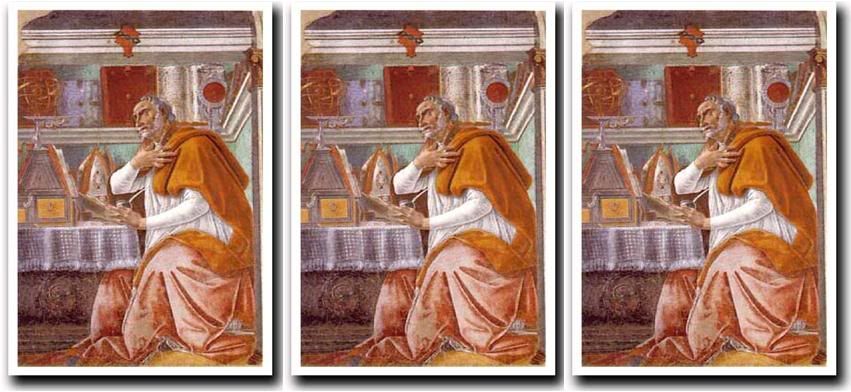
Benedict XVI's frequent references to St. Augustine tells the story of a long friendship that started in Joseph Ratzinger's youth.
Cultivating and deepening his knowledge of Augustine's work, Joseph Ratzinger entered into full harmony with it, grasped its 'newness' and revelled in the enjoyment of a kindred spirit.
Augustine became the subject of his doctoral dissertation at the University of Munich in the academic year 1950-1951. This led young Prof. Fr. Ratzinger to inquire further and to understand in a fresh manner the sacramental nature of the Church, through the Christological and ecclesiological thinking elaborated by Augustine, in whose vision and action, nothing is separated, everything tends to interact and compose together a fruitful harmony.
In fact it is obvious that the doctrine of Augustine left a deep mark on the young Ratzinger.
In the courses, seminars and lectures that he gave in the theological faculties of four German universities - Bonn, Muenster, Tuebingen and Regensburg - from the late 1950s to 1977 when he was named Archbishop of Munich-Freising, Augustine was his constant point of reference - one of the inspirational bases for his theology as well as a spiritual lighthouse of his Magisterium.
For Benedict XVI, the turbulent course of Augustine's life and his eventual anchoring in the faith was characterized above all by a 'passion for the truth', as he recalled during the solemn Eucharistic concelebration in the Orti Borromaici (Borromeo Gardens) of Pavia when he came to pay homage to the remains of Augustine (April 22, 2007).
This was not truth understood as an abstract philosophical principle, but as a tangible reality - not a remote mirage, but an incarnated truth. In which it is faith that throws wide open the horizons for such truth, leading to that essential link between 'intelligere' (to understand) and 'credere' (to believe) in the context of reason and the authority of faith, faith as thought and faith as lived.
But first of all, there was the humility with which Augustine set out to open the doors to the mystery of God - the humility to which every Christian is called: "The humility of God's incarnation should match the humility of our faith," Augustine wrote, "which lays down all-knowing arrogance and bows down when it enters to become part of the community of the Body of Christ".
After his journey to conversion and coming home to the faith, Augustine proved his humility, the Pope underscored, in the sacrifice of his own dreams (above all, once he had become a priest, to devote himself to the contemplative life), to become a living Gospel among men. In the crossroads of life - when one chooses to go one way but God asks us to go the other - such humility is required.
Augustine had the humility, placing himself totally in the service of others: "Ever anew, to be there for everyone, not for one's own perfection; ever anew, to be with Christ, to give one's life so that others may find him, who is true Life".
Augustine's humble faith was shown even in his endless desire for God's mercy. His was not the attitude of someone who has received the gift of grace once and for all, but on the contrary, of someone who all his life considered himself to be 'a mendicant of God' (mendicus Dei) and therefore continued to seek him to obtain his pardon and help.
This aspect of Augustine also highlights the urge for 'permanent conversion' together with 'the grace of perseverance' which we must pray for daily to the Lord.
Finally, the passion for truth, which in Augustine finds its outlet in his faith in Christ and in the Church, is also expressed as a great passion for man. Faith does not close one's doors, it does not isolate, it does not abandon reason and freedom, it does not exclude anything.
Rather, faith opens up, expands, orients and leads, because faith in 'God Love' (1 Jn 4,8.16) is that which manifests itself as an expansion of love, and the Church is most herself to the degree that it is a community of love.
Benedict XVI's first encyclical, Deus caritas est - which he symbolically gave to the world in front of Augustine's tomb - and which "owes very much to him" - is, in fact, a mirror of the commandment of charity, lived as service to truth and Christ's love.
In presenting Augustine, Benedict XVI arrives at the heart of his teaching, from which he has drawn the thoughts, words and examples that constitute the guidelines for his own Magisterium. Augustine is a mirror that reflects part of him.
In reviewing his theological, spiritual meditative and cultural works, one can truly grasp the Augustinian line that inspires and holds together his reflections.
There appear two be two cardinal concepts along which Benedict XVI develops his thought: truth and unity.
Truth understood as a 'symphony' according to an ancient concept revived and made famous by Hans Urs von Balthasar.
Unity understood as communion in the truth, where differences do not splinter into ruinous particularisms, but act as a bond in a reciprocity of love that always looks at the greater good, the truth - full, total and harmonious.
Absent these premises, the approach to truth becomes a 'mono-phony' rather than a 'sym-phony' - a solo rather than polyphony.
It is what Johann Moehler - one of the theologians most appreciated by Benedict XVI (along with Newman, Rosmini, Guardini, De Lubac, Congar, Von Balthasar...) - expressed in a similar way, speaking of the sense of superior beauty one gets from the sound of a polyphonic choir: not so much because they are singing impeccably, but because the training of the singers and the wisdom of their conductor are such as to blend together different voices and tonalities into one harmony.
Such is the work of Benedict XVI, who recalls in many ways the various aspects of Augustine's preaching and pastoral action.
Already in his celebrated Rapporto sulla Fede [his interview-book with Vittorio Messori), the author faced a series of theological adn moral issues - from the concept of Church to the tragedy of morals; from liturgy to separated brothers; from the theology of liberation to feminism - making his points firmly and seeking to dissipate the numerous equivocations that have surrounded these issues.
Today, some of those questions have come back; some have changed form; and some have been added on, feeding old and new debates.
Indicating the sources of the faith and an authentic interpretation of texts, Benedict XVI always has the bar firmly centered, in which faithfulness to principles, to Tradition, to a clear and solid Christian identity, does not preclude the possibility of seeing and applying - in an intelligent and balanced way - whatever will serve to be able to live the faith ever more consciously, for the Church and for men.
If, in the time of Augustine, controversies were doctrinal in nature and his contemporaries saw the strenuous efforts of the Bishop of Hippo to combat so many heresies and deviations (Manichaean, Donatist, Pelagian, etc), today the great problems are of an ecclesial and pastoral nature, considered above all within the context of that vast subject of 'the new evangelization', in a world that is getting more secularized, within the Church as well as outside it.
All of Benedict XVI's commitment, in fulfillment of his own mandate to protect and confirm his brothers in the faith, is to remind the world of the need for a strong rootedness in Christ and the perennial values of Christianity.
These are the only true prerequisites for being Christians who are mature in living their faith and credible in bringing it to others.
That is why Benedict XVI does not tire - in the name of Augustine, who is one of the founding fathers of Western culture - to rally the faithful around the Christian foundations of Europe, which serve as the mortar holding together the idea of man himself as a sacred being because he is a creature of God and inviolable in his human and personal dignity.
Without such roots, not only will the Christian identity be lost which has spiritually and culturally shaped Europe, but the profound truth about man and his destiny will likewise be stripped away instead of being at the common heart of Europe itself today.
|
| |
 13/01/2010 12:45 13/01/2010 12:45 |
|
| | | OFFLINE | | Post: 19.269
Post: 1.911 | Registrato il: 28/08/2005
Registrato il: 20/01/2009 | Administratore | Utente Veteran | |
|
 Wednesday, January 13
Wednesday, January 13
 ST. HILAIRE (HILARY) OF POITIERS (France, 315-368), Bishop, Writer, Doctor of the Church
ST. HILAIRE (HILARY) OF POITIERS (France, 315-368), Bishop, Writer, Doctor of the Church
Benedict XVI, in October 2007, synthesized the saint's life this way: "Born around the year 310, baptized when he was about thirty-five,
he became Bishop of Poitiers some eight years later. In opposition to the Arians, who believed Jesus was a created being, Hilary dedicated
his life to defending our faith in the divinity of Christ. While exiled to Frigia, because of the stance he took against the Arians at the Synod
of Béziers, he began his most important work, De Trinitate. In this text he demonstrates how both the old and new testaments clearly attest
the divinity of the Son and his equality with the Father with whom he shares one nature. In his De Synodis Hilary maintained a conciliatory
spirit with those who used deficient theological formulations, while leading them to accept fully the Nicean creed. In 360 he returned home,
took up his pastoral duties, and continued to write. The influence of his teaching spread and many were strengthened in their resistance to
Arian thought, realising that Christ is our Saviour precisely because he is true God nd true man. Fundamental to Hilary’s insight was the
importance of our Trinitarian baptismal faith. Let us join him in praying to the Lord that we remain faithful to this confession, and always
bear joyful witness to our baptismal call!" St. Hilary has been called 'Hammer of the Arians' and 'Athanasius of the West'.
Readings for today's Mass: www.usccb.org/nab/readings/011310.shtml
OR today.
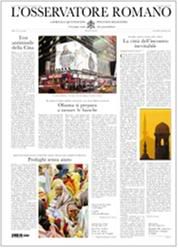 No papal stories in this issue. On Page 1: China tests an anti-missile system;
No papal stories in this issue. On Page 1: China tests an anti-missile system;
Obama prepares to tax US banks; tens of thousands of refugees have fled the civil
war in Democratic Republic of the Congo (capital Brazzaville) for the neighboring
Republic of Congo (capital Kinshasa); and a commentary on Istanbul as the current
'cultural capital of Europe' [a European city is given this designation every year].
In the inside pages is an interview with Cardinal Claudio Hummes, prefect of the
Congregation for the Clergy, who says bishops must show both firmness and a
fatherly attitude towards erring priests.
THE POPE'S DAY
General Audience - In the catechesis today, the Holy Father spoke of the extraordinary development
in the 13th century of the mendicant orders, epitomized by St. Francis and St. Dominic, who founded
their respective orders.
Pope calls on international community
to come to the aid of earthquake-stricken Haiti
The Holy Father offered his prayers and spiritual nearness to the people of Haiti whose capital, Port au Prince, was struck by a devastating earthquake early this morning, and was practically levelled, with a possible loss of thousands of lives, and most of its residents homeless.
In an appeal issued after his catechesis and plurilingual greetings at the General Audience today, the Pope said:
I wish to make an appeal for the tragic situation in Haiti. My thoughts go out especially to the population who have been struck most by a devastating earthquake, a few hours ago, which has caused grave losses in human life, a great number of homeless and displaced people, and enormous material damage.
I calll on everyone to join me in prayer to the Lord for the victims of this catastrophe and for those who mourn their loss.
I assure my spiritual closeness to those who have lost their homes and all those severely tried in various ways by this grave calamity, asking God to give them comfort and relief in ther suffering.
I appeal to the generosity of everyone, that there may be no lack of help and solidarity, and active assistance from the international community, for these brothers and sisters in their need and pain.
The Catholic Church will immediately activate its charitable institutions to extend immediate help to thost who need it most.
Meanwhile, there is a tragic bulletin from the Italian service
of the Missionary International Service news Agency:
Haiti Archbishop found dead
in the earthquake ruins
Translated from
the Italian service of

PORT AU PRINCE, HAITI, Jan. 14 (Translated from MISNA) - The lifeless body of Mons. Serge Miot (in photo, with the Pope), 66, Archbishop of Port au Prince, was found under the ruins of the Archbishop's residence, according to the missionaries of the Society of St. James, who have served in Haiti for more than 40 years.
They said they have not heard from Mons. Benoit, the Vicar General of the Haitian capital. The death of Mons. Viot was confirmed by the parish priest of the Cathedral of Haiti , according to Archbishop Bernardito Auza, the Apostolic Nuncio in Port au Prince, speaking to the FIDES news agency.
The Nuncio is also quoted in an online report by Avvenire:
'Screams and cries from the ruins:
The city center completely destroyed'
Translated from

"I have gone around Port-au-Prince to the extent that it is possible, The center is completly destroyed. The beautiful cathedral has been reduced to a pile of concrete, except for a few walls that remain standing. The Archbishop's residence is completely razed to the ground. All the churches have been destroyed - and hundreds of priests and seminarias are in the ruins. I don't think any such devastation has been seen before, Not even on TV."
These were the words of Archbishop Bernardito Auza, the Filipino who Has been Apostolic Nuncio to Haiti for less than 2 years, in an interview with Avvenire to be published in full in tomorrow's issue.
Mons. Auza said, "I have visited the President of the Republic and his wife. They are very much in shock. The Preisdential Palace collapsed shortly after they hadd left the building, and their own home crumbled down just before the First Lady was about to enter it. They have taken shelter in their garage. But the President immediately left by car to visit hospitals and get damage assessment. All the ministries, except that for culture, have been destroyed, as well as the UN headquarters, whose delegation chief is among the hundreds feared dead under the ruins".
Pope meets Christmas Eve aggressor
Translated from

The director of the Vatican Press Office released this statement at noon today:
At the end of the General Audience this morning, the Holy Father had a brief meeting with Ms. Susanna Maiolo in a room next to the Aula Paolo VI.
Ms. Maiolo expressed her regret for what took place before Christmas Eve Mass on Dec. 23, and the Pope expressed his forgiveness, as well as his interest and cordial wishes for her health.
Ms. Maiolo was accompanied by two family members.
The investigation undertaken by the Magistrature of Vatican City State will continue to its completion.
I certainly read it all wrong when I speculated a few days ago that this event was unlikely to happen! I can't second-guess the Pope, so I won't comment, except to hope fervently that it's the last time we have to hear about Ms. Maiolo,!
[Modificato da TERESA BENEDETTA 13/01/2010 23:24] |
| |
 13/01/2010 13:18 13/01/2010 13:18 |
|
| | | OFFLINE | | Post: 19.270
Post: 1.912 | Registrato il: 28/08/2005
Registrato il: 20/01/2009 | Administratore | Utente Veteran | |
|

 Pope sends pre-visit message
Pope sends pre-visit message
to the Chief Rabbi of Rome
Translated from
the Italian service of

In a telegram sent to the Chief Rabbi of Rome, Riccardo Di Segni, signed by Cardinal Tarcisio Bertone, Vatican Secretary of State, Benedict XVI expressed the wish that his visit to the Rome Synagogue on Sunday will constitute "a further step in the irrevocable journey of concord and friendship" between Jews and Catholics.
The telegram, in response to Di Segni's Christmas greetings, also expressed the Pope's 'sincere gratitude' to the Rabbi and reciprocated his 'fervent wishes' for the new year.
The Pope will visit the Synagogue on Sunday afternoon, January 17, on the occasion of the Day for Jewish-Catholic Dialog observed by the Church of Italy and the Jewish community for the past two decades.
The Pope concluded his message by expressing the hope that the visit "would manifest and increase the fraternity between Jews and Catholics".
The Pope's visit will begin with
a tribute to Holocaust victims
by Salvatore Izzo

VATICAN CITY, Jan. 12 (Translated from AGI) - The Pope's visit to the Rome Synagogue on Sunday will last at least two hours.
Benedict XVI is expected to arrive in the Jewich quarter [still called the Ghetto] at 4:25 p.m. at the Portico Ottavia on Largo XXVI Ottobre, where he will be welcomed by Riccardo Pacifici, president of the Jewish Community of Rome, and by Renzo Gattegna, president of the Italian Jewish Communities.
And the first gesture will be to offer flowers at a marker commemorating the deportation of Roman Jews to Nazi Germany on October 16, 1943.
The Pope and his entourage will then walk down Via Catalana towards the Synagogue. He is expected to stop briefly at another marker honoring 37 Jews who were injured and a two-year-old boy who died as a result of an attack as they were leaving the Synagogue.
At the entrance to the Synagogue, the Pope will be welcomed by the Chief Rabbi, Riccardo Di Segni, while a choir will chant Psalm 126.
In the prayer hall itself, The Pope will walk through the central aisle towards the front dais, and along the way, will greet other personages present including the Mayor of Rome, Gianni Alemanno.
The Pope and the Rabbi will take their seats in the center of the dais. On their left will be the Catholic and Jewish members of the Vatican's Commission for Religious Relations with Judaism, and on the right, the members of the Pope's entourage.
Speaking first for the hosts will be Pacifici, Gattegna and Di Segni.
The Pope's address will be followed by an exchange of gifts, as the choir sings the hymn 'Ani' Maamin'.
The official encounter in the Synagogue ends at 5:35, after which the Pope and the Chief Rabbi will proceed to the Synagogue garden, where an olive tree has been planted to commemorate the visit, then to the nearby Jewish Museum of Rome to inaugurate an exhibit "Et ecce gaudium" of 14 designs prepared in the 18th century by the Jewish community of Rome to mark the coronation of the Popes.
At 6 p.m., the Pope will meet other representatives of the Jewish community in the Spanish Synaogogue, returning to the Vatican at 6:15.
The Vatican Press Office has listed the members of both 'official delegations' on Sunday:
For the Jews - Shear Yashuv Cohen, Chief Rabbi of Haifa; Ratson Arussi, Chief Rabbi of Kiryat Ono; David Brodman, Chief Rabbi of Savyon; David Rosen, director of the American Jewish Commitee; David Sperber, president of the Institute of Advanced Torah Studies at the University of Bar-Ilan (Israel); Oded Wiener, secretary-general of the Grand Rabbinate of Israel; and Josef Levi, Chief Rabbi of Florence.
The Vatican delegation includes Cardinal Jorge Mejia, who organized the visit of John Paul II in 1986; Cardinal Walter Kasper, president of the Vaticna Commission for Religious Relations with Judaism, along with the Commission Secretary, Fr. Norbert Hoffman; Mons. Fouad Twal, Patriarch of Jerusalem; Mons. Antonio Franco, Apostolic Nuncio in Israel; Mons. Elias Chacour, Bishop of Akka (historic Acre in north Israel); Mon, Bruno Forte, Bishop of Chieti (a noted Biblicist and theologian); the Auxiliary Bishop of Galilee, Mons. Giacinto Boulos Marcuzzo; the Custodian of the Holy Lnad, Franciscan Fr. Pierbattista Pizzaballa; and the Prefect of the Ambrosian Library, Mons. Pierfrancesco Fumagalli.
The Pope will be accompanied, as usual, by the Prefect of the Pontifical Household, Archbishop James Harvey, and his deputies, Mons. Paolo De Nicolo and Fr. Leonardo Sapienza, and the Pope's private secretary, Mons. Georg Gaenswein.
Posted today by Benetus on
 some background on the feast observed by the Roamn Jews on January 17, which falls this year on the date of the Pope;s visit to the Rome Synagogue:
some background on the feast observed by the Roamn Jews on January 17, which falls this year on the date of the Pope;s visit to the Rome Synagogue:
The Jewish writer Sam Waagenaar in The Pope’s Jews, anti-papal with a light-hearted cynicism, points out some needed context, which is further filled in by histories of the Eternal City.
...By January 17, 1793, the French Revolution was in full swing, with martyrs already executed and many exiled French clerics living in Rome and recounting what they knew of the situation.
Revolutionary propaganda was passing the frontier into Italy, and the local colony of Frenchmen attached to their government’s embassy in Rome was noteworthy for its public support of the anti-Catholic revolution.
Many of these French took great pleasure in riding around the city of the Popes sporting tricolor emblems of the regime that was opposed to all traditional authority both civil and ecclesiastical. Many Romans were fed up with the arrogant provocations of the French, and on January 13 they decided they would not put up with it any longer.
Some Frenchmen doing their usual thing in a Roman thoroughfare were set upon by a mob and one was killed. (A priest arrived in time for him to repent and confess before expiring.) There is no doubt that much of the Roman populace, if not the great majority of it, was at that time thoroughly loyal to the Pope as their prince.
And due to the centuries-old vicious circle of provocations, economic struggle and governmental restrictions on the Jews, the populace naturally suspected the Roman Jews of being a fifth column in league with revolutionary France.
The papal police forces surrounded the ghetto and began conducting searches for evidence of such collaboration. It was providential for the Jews that they were there, because when a crowd began to light and feed a fire at one of the ghetto’s two gates, it was a papal officer who stopped them with something like the following appeal to their better side: “My children, my dear children, the Pope is sure to be highly pleased by your attachment to his dignity, but he does not want the oppression of these poor people, because they are innocent. If you love the Pope, then let us together burn this wood in his honor, and this will be the sign and expression of your love for him.” (The Pope’s Jews, p. 240.)
With that, the accumulating wood for the fire was transferred to the square in front of the Church of San Gregorio della Divina Pietà, as a bonfire in the Pope’s honor.
A Roman aristocrat shouted into the still endangered ghetto, “Don’t be afraid! Trust in God and in your Holy Prince who only wants to protect you!” And with that, a rainstorm suddenly broke out and the Jews’ miserable wooden apartments were saved.
The Church of San Gregorio della Divina Pietà, where a papal officer persuaded an angry crowd to honor their papal sovereign rather than burn out the nearby Jews, still stands, but now dwarfed by the imposing synagogue across the street, constructed under the liberal and Masonic-influenced regime that seized Rome some decades after Pius IX freed the Jews from his predecessors’ legal restriction of their residence to the walled ghetto.
On the façade of San Gregorio della Divina Pietà, a lovely painting of the Crucifixion over an inscription in Hebrew and Latin, drawn from the passage of Isaiah (65:2) which inspired St. Paul’s reproach about the unbelieving Jews in his epistle to the Romans: “I have spread out my hands all day to a rebellious people, which walketh in the way that was not good, after their own thoughts.”
This blogger is overjoyed that the inscription still survives in today's climate of politicamente e religiosamente corretto. On the other hand, a Catholic’s exultant feelings should turn bittersweet with a little knowledge of what life was like for the mainly poor Jews whom three centuries of Popes did not allow to reside outside the now vanished walls of the ghetto....
This is one of those items I am obliged to post no matter how outrageous and - in some ways, wilfully ignorant - it is, because it demonstrates a most lamentable drift by militant Jews not just to perpetrate their mortal hostility to Pius XII but, in the process, to make Benedict XVI just as much an object of their hostility because he is German and because he is an advocate of Pius XII.
Israel rabbi asks Pope
to halt Pius's beatification

ROME, Jan. 13 (AP) – Pope Benedict XVI should be welcomed when he visits Rome's main synagogue, but he should halt moves to beatify wartime pontiff Pius XII, criticized for not doing enough to stop the Holocaust, a former chief rabbi of Israel said Tuesday.
Israel Meir Lau, a Holocaust survivor and now chief rabbi of Tel Aviv, said Benedict's synagogue visit Sunday would be "appreciated and blessed." But in an interview with Italy's Sky TG24 television, he said he was "surprised" by Benedict's decision last month to move the controversial World War II-era pope closer to sainthood.
Benedict sparked outrage among some Jewish groups by signing a decree on Pius' heroic virtues, paving the way for him to be beatified once a miracle attributed to his intercession is confirmed.
Some Jews and historians have argued that Pius, pope from 1939-1958, was largely silent on the Holocaust and should have done more to prevent the deaths of 6 million Jews at the hands of the Nazis and their collaborators.
The Vatican insists Pius used quiet diplomacy to try to save Jews and that speaking out more forcefully would have resulted in more deaths.
It said last month the decree on his heroic virtues wasn't so much a historical assessment of his pontificate as a confirmation that he had led a deeply Christian life.
In the past, Jewish leaders had asked the Pope to put the beatification on hold until archives on Pius's pontificate are opened to outside scholars. The Vatican has said those archives won't be catalogued and ready until 2014 at the earliest.
In the interview broadcast Tuesday, Lau said Benedict should halt the process for this generation, saying that beatifying Pius would offend Holocaust survivors.
Lau urged the Pope "not to take the next step for the beatification of Pius XII, not in this generation," adding this would "hurt the feelings of those Holocaust survivors who are still alive."
Lau spoke in Hebrew and his words were mostly covered by an Italian translation. Calls to the rabbinate to confirm his comments were not answered Tuesday evening.
Asked by Sky's reporter how Jews compared Benedict to his predecessor, the Polish-born Pope John Paul II, Lau said the biggest contrast was in their wartime record.
[This is outrageous - the difference he cites is not out of something either man chose, but entirely as a consequence of what country they belonged to. It is an obvious and shameless ploy to link Benedict XVI to the Nazis, thus implying his complicity in the Holocaust because of his nationality.]
"John Paul II spent the Holocaust on the side of the victims, while Benedict XVI spent World War II on the other side of the barricade, and this can be a big difference," he said according to the translation.
John Paul suffered through the Nazi occupation of his country. The German-born Benedict was forced to join the Hitler Youth and then served in the army before deserting near the end of the war.
I have to wonder: If, for some reason, it had been possible for the Congregation on the Causes of Sainthood to approve a decree on Pius XII's heroic virtues during John Paul II's Pontificate, and John Paul II had promulgated it - there would have been no reason, according to all the rules of canonization in the Church, for him not to do so - what would the reaction of the Jews have been?
And my second question: Was there a specific reason why the decree on heroic virtues was not acted on during the 27 years of John Paul II's Pontificate, seeing as Paul VI had introduced the cause in 1965? Or was there some behind-the-scenes guru of political correctness in the Roman Curia who decided it would be very impolitic to even consider the issue- after all the Jewish goodwill following the Pope's apologies for Christian anti-Jewish actions in the past?
[Modificato da TERESA BENEDETTA 13/01/2010 23:37] |
| |
 13/01/2010 14:54 13/01/2010 14:54 |
|
| | | OFFLINE | | Post: 19.271
Post: 1.913 | Registrato il: 28/08/2005
Registrato il: 20/01/2009 | Administratore | Utente Veteran | |
|

 On the Pope's recent state-of-the-world address to Vatican diplomats, trust Fr. Schall to single out a highlight that would otherwise have gone unnoticed by the commentariat. Very apropos, in view of the popularity in recent years of books by militant atheists. To what effect?
On the Pope's recent state-of-the-world address to Vatican diplomats, trust Fr. Schall to single out a highlight that would otherwise have gone unnoticed by the commentariat. Very apropos, in view of the popularity in recent years of books by militant atheists. To what effect?

January 13, 2010
 ignatiusinsight.com/features2010/schall_believingatheists_j...
ignatiusinsight.com/features2010/schall_believingatheists_j...
Finally, I would like once again to express my joy and gratitude for my visit to the Czech Republic. Prior to this journey I had always been told that it was a country with a majority of agnostics and atheists, in which Christians are now only a minority.
All the more joyful was my surprise at seeing myself surrounded everywhere by great cordiality and friendliness, that the important liturgies were celebrated in a joyful atmosphere of faith, that in the setting of the University and the world of culture my words were attentively listened to, and that the state authorities treated me with great courtesy and did their utmost to contribute to the success of the visit.
- Benedict XVI, Address to the Roman Curia, December 21, 2009.
Life is a jest, and all things know it, / I thought so once, but now I know it." -- Gay's Epitaph in Westminster Abbey. [1]
I.
In a favorite passage, one of C. S. Lewis' young devils is told by a wiser mentor that a "young atheist cannot be too careful about what he reads." That is to say, many traps are our there for the atheist who thinks his system can cover everything.
One has to work hard at being an atheist. He has to be prudent. He has to be on his guard. Even more than the believer, he cannot allow himself to doubt. In a way, he is the only "true believer."
Even his own reason is worrisome to him, for why, after all, is reason reasonable? His view is by no means protected on the reason flank, nor is the agnostic flank, when spelled out, coherent. Just not to know one way or another still leaves the agnostic with the question of how he should live. He relies on his reason to tell him.
The young atheist never knows when he will run into an act of goodness that makes no sense in his philosophical world. Nor is he immune from the horror that comes to him on beholding a really heinous act deliberately carried out by some politician or philosopher.
His atheism may force him to be indifferent either to good or evil, to be not surprised at either. And yet, if he asks himself which model of life is"better," he can hardly choose the latter, the more savage one.
Atheists often claim, somewhat illogically, to live "better" lives than believers. Seldom do they claim to live worse ones. Christians know and acknowledge that they are sinners.
The "sins" of the atheist are less straightforward. Against who or what can he sin? Against himself? Against the world? Surely not God. Are there "good" and "bad" atheists? How so?
Benedict XVI gives a considerable amount of attention to atheists and agnostics. The relation between modern German philosophy and modern atheism is not, after all, an unheard of connection. In fact, philosophical atheists are much easier to deal with intellectually than, say, Muslims or Buddhists who have fewer groundings in reason.
The pope knows the philosophical origins of modern atheism as well as any living atheist. Actually, I think he frightens them. It must seem eerie to have a man on the throne of Peter who thoroughly knows the atheist mind. It takes the fun out.
And if the atheist does not know or acknowledge this fact, it is only because, as the young devil said, he has been very careful about what he reads. That is relatively easy to do, namely to ignore the depths of the Christian philosophical understanding of atheism.
This is especially true in universities where certain topics are excluded from consideration. Among these is this very issue about the coherence of the relativist, agnostic, or atheist views.
Scholars speak of two kinds of atheism, an ancient one and a modern one. Classical atheism was from writers and poets like Epicurus and Lucretius. These men were not "apostolic" sorts of atheists. Generally, they did not go out to convert anyone.
Rather, they belonged to the post-Aristotelian philosophies of withdrawal. The political and empire world frightened them with its strangeness, loneliness, and wickedness. They withdrew into a garden to exclude the chaotic world as best they could. None of it made sense.
Atheism was a resignation. It sought a way to survive in quiet. A certain charm and poignancy surrounded the classical atheists. They are well worth reading, even today.
What concerned the classical atheists most was religion — somebody else's religion — and its claim on their souls. The gods, with their talk of rewards and punishment, frightened them.
They preferred nothing to the fear of the gods. They were moderate and self-controlled. They knew that excess and corruption only made what little time on earth seem prolonged and nasty. They were cautious about love especially as it implied commitment, unsettlement.
Their goal in life was to be unmoved, undisturbed by passing things. Nothing was to bother them. No one could do anything about most of it anyhow. They could withdraw and live out their days.
Modern atheism, curiously, is much more aggressive. Like Islam, I suspect it has "Christian" origins in this sense. The modern atheist can be an apostle. He wants to be on television explaining the big picture to the masses, how there is no need of the "hypothesis" of God.
He evidently considers himself to have an airtight "proof" for his position, which, to be sure, he doesn't. Many a "scientific" atheist is a sloppy philosopher.
Paradoxically, the modern atheist lives in a time when Big Bang theories, the anthropic principle, and general suspicions of design in the cosmos seem to cast doubt on his world view. This doubt comes not from the side of religion but from the side of science, on which his whole argument rests.
He can, however, as he thinks, "demonstrate" that God does not exist. He can prove a negative. He wants to inform the world that it has no origin or destiny, certainly none that involves man with his special creation and destiny. He is not happy, as was Epicurus, to withdraw and live out his life in a garden. He wants to shout it from the rooftops. He has tenure.
II.
Benedict, as we know, has set a large agenda for himself. He intends to leave no one alone, including the contemporary atheist, who sometimes seems by-passed by the ecumenical movement.
Since he claims to be a"reasonable" being, however, the atheist is no longer free to follow the example of the ancient atheists and disappear so that he can live his life out in such peace as he can find. He knows, as he thinks, that there is nothing. But he wants to be sure everyone knows that he knows.
The pope told the Curia:"I could now be tempted to say something about the beauty of the country and the magnificent testimonies of Christian culture (in the Czech Republic) which only make this beauty perfect. But I consider most important the fact that we, as believers, must have at heart even those people who consider themselves agnostics and atheists."
The pope does not intend to let the agnostic and the atheist life, in his own incoherent world, go unnoticed and un-responded to.
The pope is not concerned, of course, with "imposing" anything on anybody except the truth, and that of its own brightness. The Pope's own knowledge of the history and attraction of atheism comes in here.
Atheists, of course, "do not want to see themselves as an object of mission." They want to keep their "freedom of thought and will." The atheist is never asked to give up his freedom of thought or free will.
Christianity is insistent that knowledge and will as such are good things for everyone, including atheists. These powers need to be rightly understood and used, but the last thing Christianity asks of anyone is to "give up" his powers of mind and will.
"Today, in addition to inter-religious dialogue," the Pope adds, "there should be a dialogue with those to whom religion is something foreign, to whom God is unknown and who nevertheless do not want to be left merely Godless, but rather to draw near to him, albeit as the Unknown."
Benedict next recalls that while he was in Paris, he spoke of the relation between Europe and monasticism. "The quest for God (is) the fundamental reason why Western monasticism and with it, Western culture, came into being."
Atheism itself, in its own way, participates in this heritage. The culture itself bears this mark.
What follows? "We must seek to keep this quest alive; we must be concerned that human beings do not set aside the question of God, but rather see it as an essential question for their lives. We must make sure that they are open to this question and to the yearning concealed within it."
This is but a Christian version of Socrates's "examined life." Not even atheism is "worth living" if it is not examined, however profoundly.
People, of course, can refuse to know or want to know what they are and what really drives their souls. They can implicitly reject anything that would seem to undermine any confidence in that to which they have committed themselves.
I suspect atheism becomes militant and politically closed the moment it suspects the integrity of its own roots. In his response to Jűrgen Habermas, Benedict wrote directly to the concern of many atheists:
"There are also pathologies of reason; although mankind in general is not as conscious of this fact today. There is a hubris of reason that is no less dangerous (than that of religion). Indeed, bearing in mind its potential effects, it poses an even greater threat...." [2]
Essentially, atheism is a "pathology of reason." Its cure is, in some sense, prayer and fasting, as the pope suggests. But it is also in reason itself.
The Church does not give up on the integrity and consistency of reason simply because some atheists maintain their position is the only "reasonable" one. In principle, the only cure for a disorder of reason is ordered reason. But it may require virtue to see it and follow it.
III.
In his essay on John Gay's Epitaph, Johnson observes, in a remarkable passage:"Little follies and petty weaknesses, of no moment in common life, may, when they enter into the characters of men of high station, obstruct the happiness of a great part of mankind."
For Johnson, this result has happened to Gay's principle:"Life is a jest, and all things show it; / I thought so once, but now I know it." Johnson tells us that he is"offended" by such a passage, in such a high place.
To give it its due, Johnson thought it might be a"drunken sally," applauded after midnight as an epigram, but the proper place for it is not Westminster Abbey but"the window of a brothel."
Sepulchral epitaphs are designed to edify, not confuse. Johnson cites the epitaph of Sesostris, which reads:"Let every man who looks upon me learn to be pious." That should be the proper effect in recalling the names of the dead. In his epitaph, Gay pictures himself as returning from the dead to tell mankind that its life"is a jest."
This presumed insignificance of human life brings us back to the atheist issue."Mankind, with regards to their notions of futurity, are divided into two parties, a very small one that believes or pretends to believe, that the present is the only state of existence; and another, which acknowledges that, in some life come, men will reach rewards and punishments according to their behavior in this world." This division of mankind obviously refers to the atheist position with which we have been dealing.
The epitaph tells us that the man of whom it is written has "certainly" returned to inform us mortals that life is but a jest.
One of the classes of mankind might think this was true and so live accordingly."But I must leave it to acuter reasoners how he (Gay) could in that case know it after death, being for my part inclined that knowledge ceases with existence."
If this reappearance be true, we cannot know it. But if, on the other hand, the man thought that there were rewards and punishments, as Plato also held, then he would think that life is more than a jest, "unless he thought eternity is a jest."
But by now, the dead man will know for sure one way or another. He most certainly will be "undeceived" over the issue.
Johnson concludes: "These lines (of Gay), therefore, are impious in the mouth of a Christian and nonsense in that of an atheist." They ought not to be in Westminster. There, "buffoonery appears with a very ill grace, and impiety with much worse, in temples and on tombs."
Johnson explains: "A childish levity has of late infected our conversation, but let it not make its way into our churches." There is a desire to be hoped for, even today!
We should be careful what we reveal of our souls: "Let us have some regard to our reputation amongst foreigners, who do not hold either fools or atheists in high reputation."
Johnson hopes that his generation can erase such epitaphs so that future generations will not have to do so. No one wants to be thought to be either a fool or an atheist by foreigners, who themselves, to be sure, may be either, as the pope hints.
John Gay died in 1732. His funeral was said to be a noble affair. He wrote the famous "Beggar's Opera," the remote origins of "Mack the Knife," of Louis Armstrong and Bobby Darin fame. We cannot but wonder at Gay's added lines on his own epitaph, which was composed by Alexander Pope himself.
Gay indeed thought that life was a jest, but he does not know it. The very fact that he still teaches his atheism in Westminster is a sign of his desire for fame beyond his death. The countries of "atheism and agnosticism" are still with us.
Johnson's division of mankind remains evident: Either this life is the only state of existence or, in some"futurity," there will be a judgment of rewards and punishments.
Benedict, following the Creed, teaches us that this latter is true, that the world is not complete until it is judged in justice. The young atheist cannot be too careful about what he reads.
"Believing" atheists are those who think their position rests on what they call "reason." But their "reason" is not grounded until they tell us why anything should be "reasonable" in the first place.
We Christians think, ultimately, it is because the world is created in Logos. Ultimately if he pushes his reason far enough, consistently enough, this is what he too will find at the heart of things.
ENDNOTES:
[1] Samuel Johnson,"On Gay's Epitaph" (1738), Samuel Johnson: The Major Works (Oxford: Oxford University Press, 200), 51-53.
[2] Jűrgen Habermas and Joseph Ratzinger, Dialectics of Secularization: Reason and Religion (San Francisco: Ignatius Press, 2006), 77-78.[Modificato da TERESA BENEDETTA 21/02/2010 21:45] |
| |
 13/01/2010 15:29 13/01/2010 15:29 |
|
| | | OFFLINE | | Post: 19.272
Post: 1.914 | Registrato il: 28/08/2005
Registrato il: 20/01/2009 | Administratore | Utente Veteran | |
|
 GENERAL AUDIENCE TODAY
GENERAL AUDIENCE TODAY
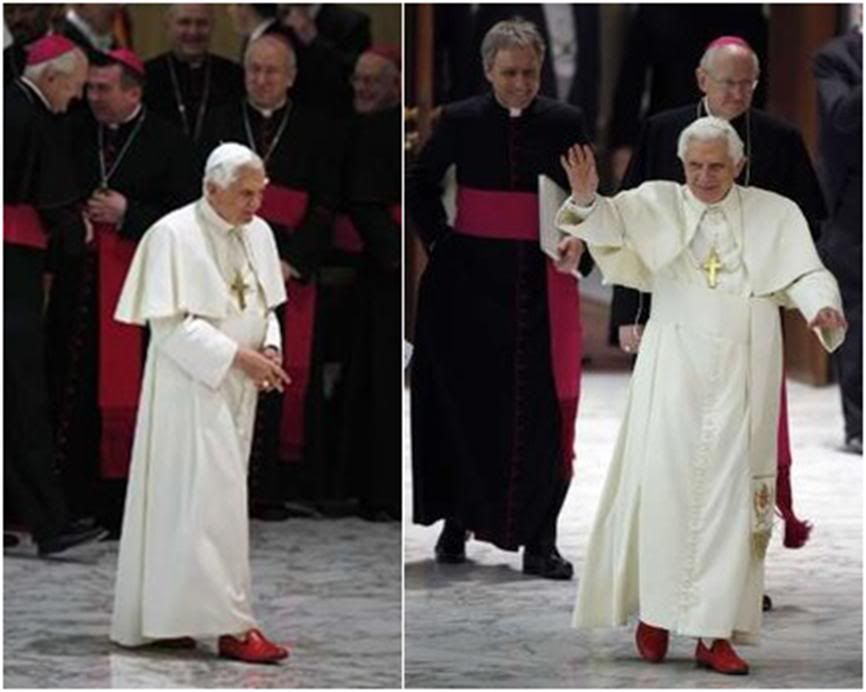
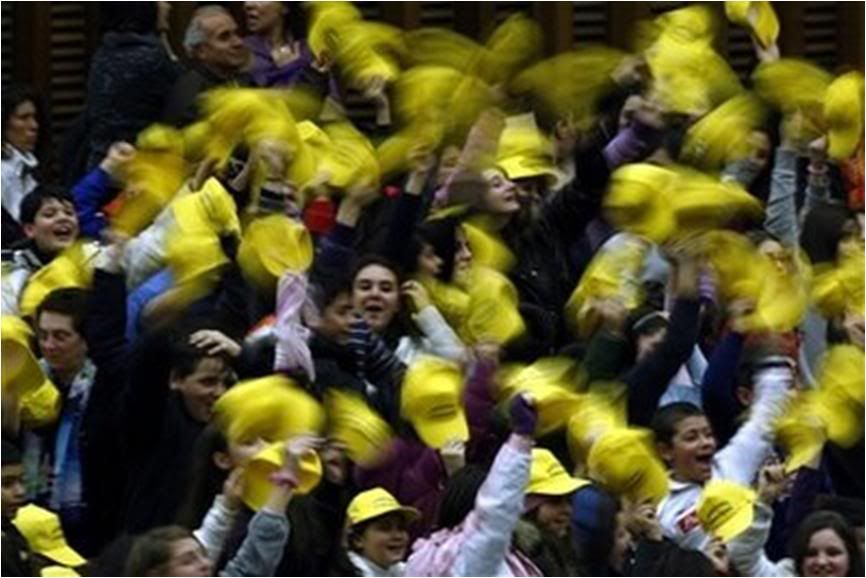
Pope Benedict XVI held his first General Audience for 2010 at the Aula Paolo VI this morning, during which he issued a special appeal in behalf of the earthquake-stricken people of Haiti.
Resuming his catechetical cycle on Christian culture in the Middle Ages, he spoke of the Mendicant Orders (Franciscans and Dominicans} and their extraordinary development in the 13th century.
Here is how he synthesized today's lesson in English:
In our catechesis on medieval Christian culture, we now consider the movement of ecclesial reform promoted by the two great Mendicant Orders.
In every age the saints are the true reformers of the Church’s life. In the thirteenth century Saints Francis and Dominic inspired a vast evangelical renewal which met three significant needs of the Church of that time.
The Franciscans and the Dominicans adopted a lifestyle of evangelical poverty which, unlike that of the Cathars, was grounded in communion with the visible Church and a sound Christian understanding of the goodness of creation.
As zealous preachers, especially in urban environments, the Friars provided religious instruction and spiritual guidance to the lay faithful, many of whom became members of their "Third Orders".
Travelling freely from place to place, they also contributed to the overall renewal of Church life and the spiritual transformation of society.
By their presence in the universities, the Friars worked for the evangelization of culture, affirming the harmony of faith and reason, and creating the great syntheses of scholastic theology.
May their example of holiness and evangelical lifestyle inspire our own witness to the Gospel and our efforts to draw the world to Christ and his Church.
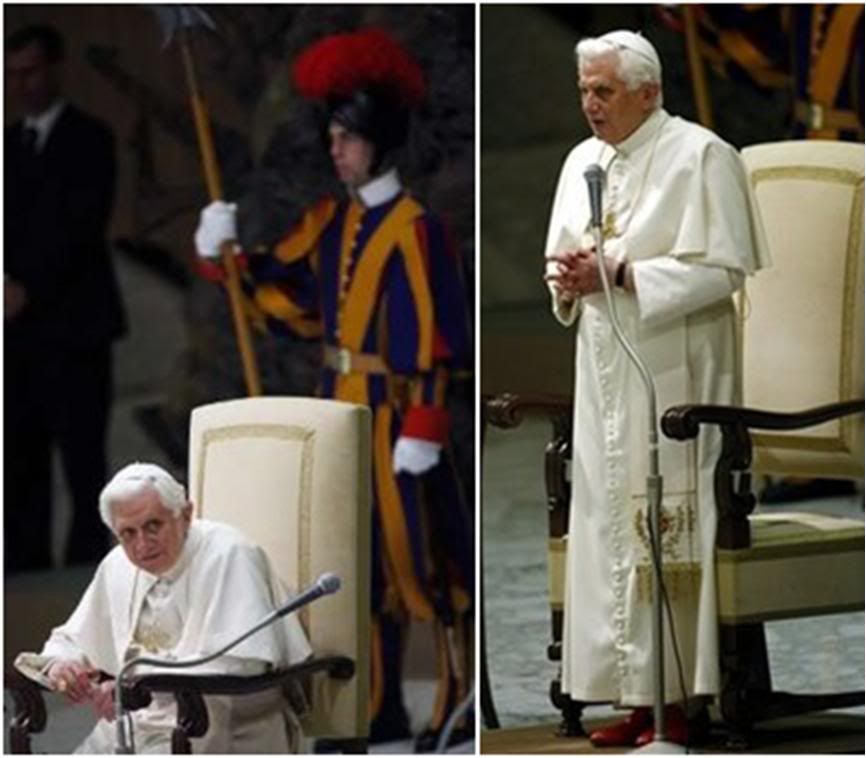
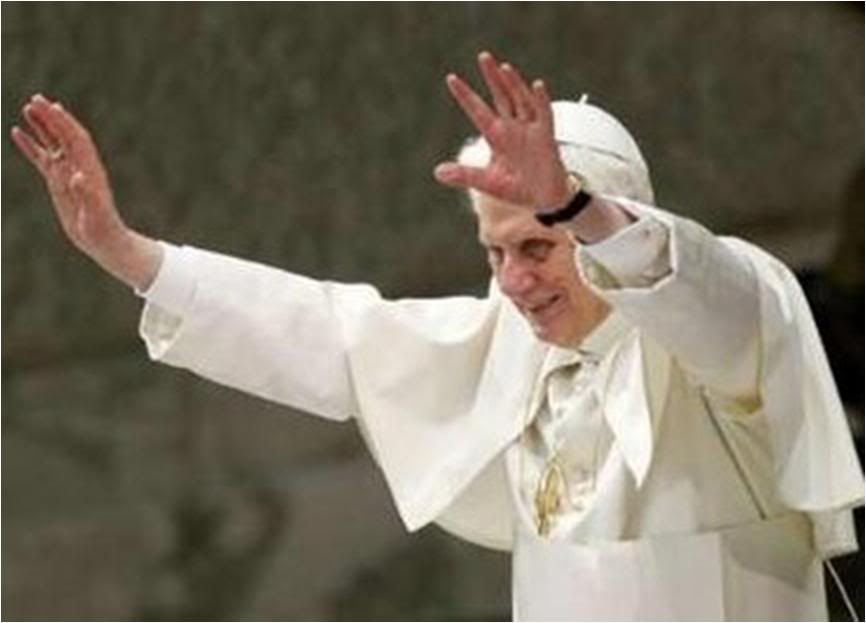
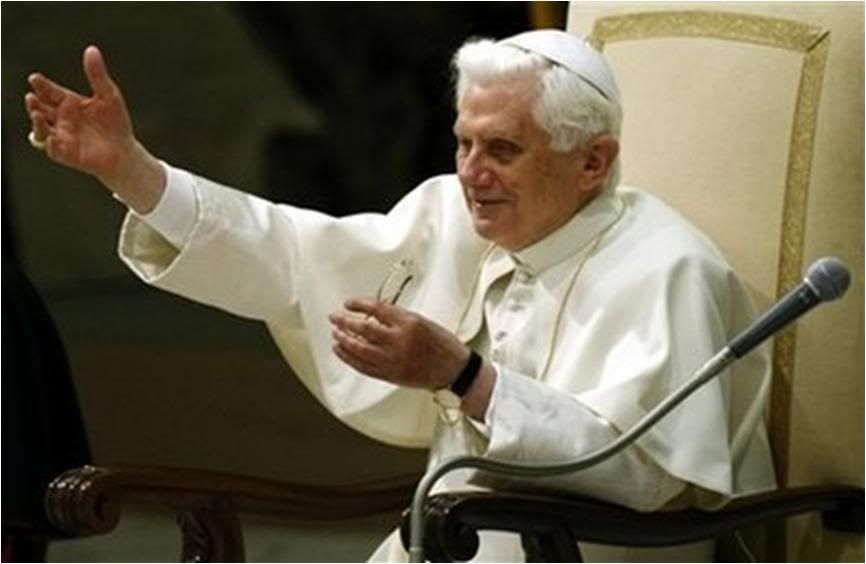
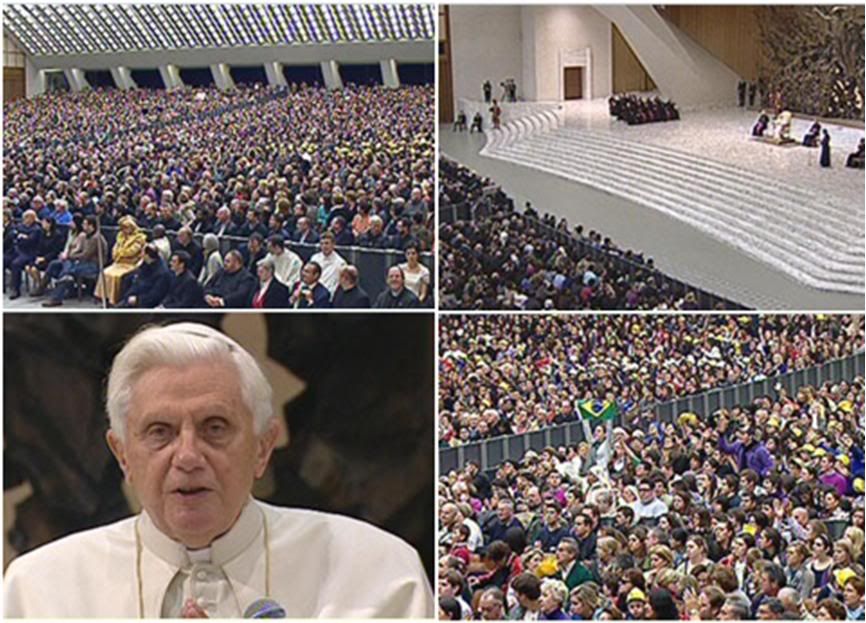 Here is a full translation of the catechesis:
Here is a full translation of the catechesis:
Dear brothers and sisters:
At the start of the new year, let us look at the history of
Christianity to see how history can develop and how it can be renewed.
In it, we can see who are the saints, guided by the light of God - the true reformers of the life of the Church and of society.
Teachers by words and witnesses by example, they are able to promote a stable and profound ecclesial renewal and they are in touch with the true good news: the presence of God in the world.
This comforting reality - that in every generation, saints are born who have the creativity of renewal - has accompanied the history of the Church amidst the sorrows and negative aspects of her journey forward.
Indeed, we see, every century, the birth and rebirth of the forces of reform and renewal, because the novelty of God is inexorable, and always gives new strength to move ahead.
Thus it happened in the 13th century, with the extraordinary development of the Mendicant Orders - a model for great renewal in a new historical era.
They were so called because of their characteristic feature of 'begging' - that is, relying humbly with the economic assistance of the people so they could live their vow of poverty and carry out their evangelizing mission.
Of the Mendicant Orders that emerged in that time, the best known and most important are the Friars Minor and the Friar Preachers, better known as Franciscans and Dominicans, respectively.
They are named for their founders, Francis of Assisi and Dominic de Guzman. These two great saints had the ability to read the 'signs of the times' intelligently, sensing the challenges that the Church of their time had to face.
A first challenge was represented by the expansion of various groups and movements of the faithful who, although inspired by a legitimate desire for authentic Christian life, often acted outside the communion of the Church. They were in profound opposition to the rich and beautiful Church that had developed with the flowering of monasticism.
In recent catecheses, I dwelt on the monastic community of Cluny, which had always attracted young and vital forces, as well as material goods and wealth. That is why, logically, what developed initially was a Church rich with properties and buildings.
Opposing such a Church was the idea that Christ came to earth as a poor man and that the true Church should be the Church of the poor. The desire for Christian authenticity therefore opposed the reality of the empirical Church. Thus, the so-called pauperist movements of the Middle Ages.
They openly contested the lifestyle of the priests and monks of the time, accusing them of having betrayed the Gospel and failing to practice poverty like the early Christians. These movements opposed a true 'parallel hierarchy' to the bishops. And in order to justify such decisions, they also disseminated doctrines that were incompatible with the Catholic faith.
For example, the movement of the Catari or Albigensians re-proposed ancient heresies, such as devaluation and contempt of the material world. The opposition to wealth quickly became opposition against material reality itself - the negation of free will, and thus dualism - the claim that there is a principle of evil on the same level as God.
These movements were successful especially in France and Italy, not only for their solid organization, but also because they denounced a real disorder in the Church as a reult of the far from exemplary behavior of various representatives of the Clergy.
The Franciscans and the Dominicans, in the footsteps of their founders, demonstrated instead that it was possible to live in evangelical poverty - the truth of the Gospel as such - without separating from the Church.
Thus they showed that the Church remains the true and authentic place for Gospel and Scripture. Indeed, Francis and Dominic drew the power of their testimony from their own intimate communion with the Church and with the Papacy.
With a choice that was completely original in the history till then of consecrated life, the members of these Orders not only renounced personal possessions, as monks had done from the earliest times, but they did not even wish to be associated with earthly communities and real properties.
Thus they meant to bear witness to an extremely sober lifestyle in order to show brotherly solidarity with the poor, confiding only in Providence - to live day to day out of Providence and their trust in putting themselves in God's hands.
This personal and communitarian style of the Mendicant Orders, united to their total adherence to the teaching of the Church and its authority, was much appreciated by the Popes of the time, like Innocent II and Honorius II, who offered their full support to these new ecclesial experiences, recognizing the voice of the Spirit in them.
The fruits were apparent. The pauperist groups that had been separated from the Church re-entered into communion with the Church, or slowly changed until they died out.
Even today, though we live in a society where often 'having' prevails over 'being', we are quite sensible to the examples of poverty and solidarity that believers show when making courageous choices.
Even today, similar initiatives are not lacking - in the movements that are truly based on the novelty of the Gospel and who live it radically in our day, placing themselves in the hands of God, in order to serve their neighbor.
The world, as Paul VI reminds us in Evangelii nuntiandi, gladly listens to teachers when they are also witnesses. This is a lesson never to be forgotten in the work of spreading the Gospel: to live in person that which one announces, to be a mirror of divine charity.
Franciscans and Dominicans were witnesses but also teachers. Indeed, another demand which was widespread in their time was religious instruction.
Not a few lay faithful who lived in cities under expansion wanted to practice a spiritually intense Christian life. Thus, they sought to deepen their knowledge of the faith and to be guided through the arduous but fascinating path of sanctity.
The Mendicant Orders gladly set forth to meet this end: the announcement of the Gospel in its simplicity, but also in all its profundity and grandeur, was an objective, if not the principal objective of this movement. And indeed, they dedicated themselves with great zeal to preaching.
Numerous faithful, often true and proper crowds, gathered to listen to these preachers in churches and in open spaces. Think of St. Anthony [of Padua], for example.
The preachers dealt with subjects close to the life of the people - above all, how to practice the theological and moral virtues, with concrete examples that were easily understandable.
They also taught ways to nourish a life of prayer and piety. For example, the Franciscans widely disseminated devotion to the humanity of Christ, with the aim of imitating the Lord.
It is not surprising then that there were numerous men and women who chose to take the Christian way of the Franciscan and Dominican friars, who were highly sought and appreciated spiritual directors.
Thus were born associations of lay faithful, inspired by the spirituality of St. Francis and St. Dominic, as adapted to their own status as laymen. These are the Third Orders, Franciscan and Dominican.
In other words, the proposal for a 'lay sainthood' conquered many faithful. As the Second Vatican Council reminded us, the call to sainthood is not reserved to some but is universal (cfr Lumen gentium, 40). In all conditions of life, according to the demands of each of then, it is possible to live the Gospel. Even today, every Christian should aim for 'the high standard of Christian life', whatever his status in life.
The importance of the Mendicant Orders grew so much during the Middle Ages that lay institutions, like work organizations, ancient corporations and guilds, and civilian authorities themselves, often availed of members of these Orders for spiritual counsel and guidance in drafting their own rules, and sometimes, even to help solve internal and external conflicts.
The Franciscans and Dominicans became the spiritual inspiration of the medieval city. And with great intuition, they set into motion a pastoral strategy adapted to the transformations in society.
Since many people were moving from the countryside to the cities, they started to build their monasteries and convents no longer in rural zones, but in the cities.
Moreover, in order to carry out their activities as pastors of souls, they moved around depending on pastoral necessities. In another choice that was completely innovative, the Mendicant Orders abandoned the principle of stability that had been classic in early monasticism, and travelled from one place to another with missionary fervor. Consequently, this resulted in an organization that was different from those of most other monastic orders.
In place of the traditional autonomy that each monastery had, these institutions assigned grater importance to the Order in itself and to the Superior General, as well as to the structure of their 'provinces'. Thus the Mendicants were much more available for the needs of the Universal Church.
This flexibility made it possible to send friars who were more adapted to carry out specific missions, and the Mendicant Orders reached North Africa, the Middle East and northern Europe. This flexibility renewed missionary dynamism.
Another great challenge was represented by the cultural transformations under way at that time. New issues gave rise to lively debates in the universities that were born towards the end of the 12th century.
Minors and Preachers [i.e., Franciscans and Dominicans] did not hesitate to take on this demand, and as students and professors, they joined the most famous of the early universities, set up centers for study, produced texts of great value, gave rise to true and proper schools of thought, became the protagonists of scholastic theology in its best period, and made a significant mark in the development of thought.
The greatest of their thinkers, St. Thomas Aquinas and St. Bonaventure, worked precisely with the dynamism of the new evangelization - which had also renewed the courage to think - and the dialog between reason and faith.
Even today, 'charity in and of the truth', an 'intellectual charity', must be exercised in order to illuminate intelligence and conjugate faith with culture.
The profuse commitment of the Franciscans and Dominicans in the medieval universities is an invitation, dear faithful, to be present in the places where knowledge is elaborated, in order to propose, with respect and conviction, the light of the Gospel on the fundamental questions that are of interest to man, his dignity and his eternal destiny.
Thinking back to the role of Franciscans and Dominicans in the Middle Ages, to the spiritual renewal that they inspired, to the breath of new life that they communicated to the world, a monk said: "At that time, the world was growing old. Two Orders emerged in the Church, who renewed its youth like that of an eagle" (Burchard d’Ursperg, Chronicon).
Dear brothers and sisters, at the start of this new year, let us invoke the Holy Spirit, the eternal youth of the Church. May he make each of us feel the urgency of offering consistent and courageous witness to the Gospel, so that we may not lack for saints, without spots or wrinkles, who are capable to irresistibly attract the world towards Christ, towards its salvation.
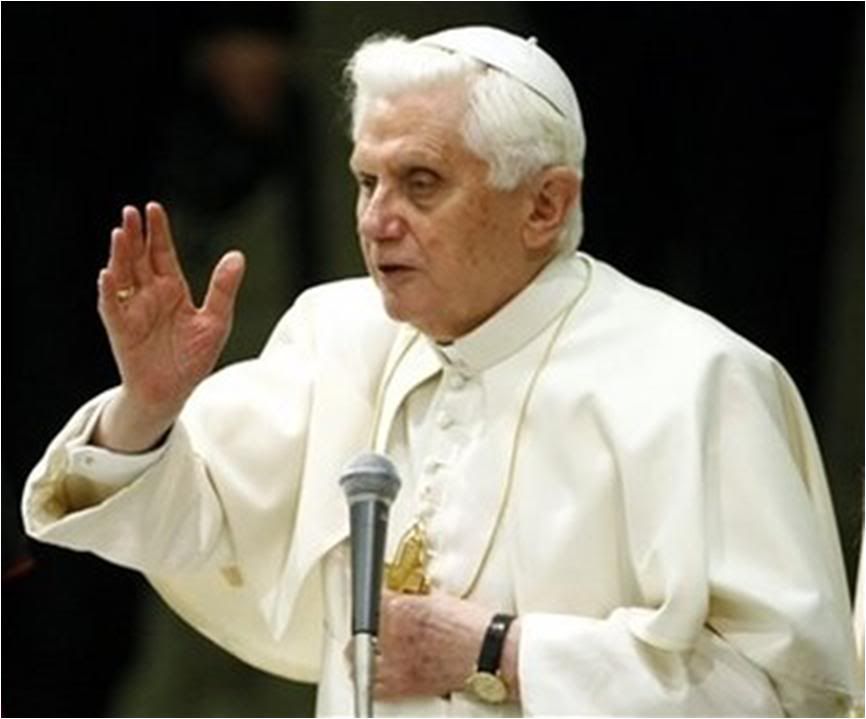
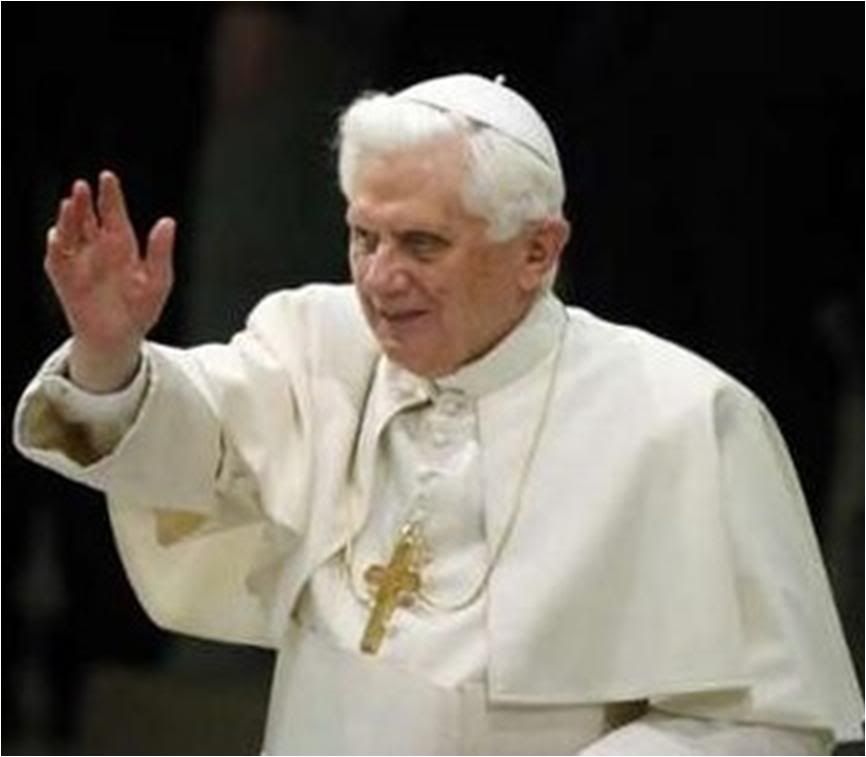
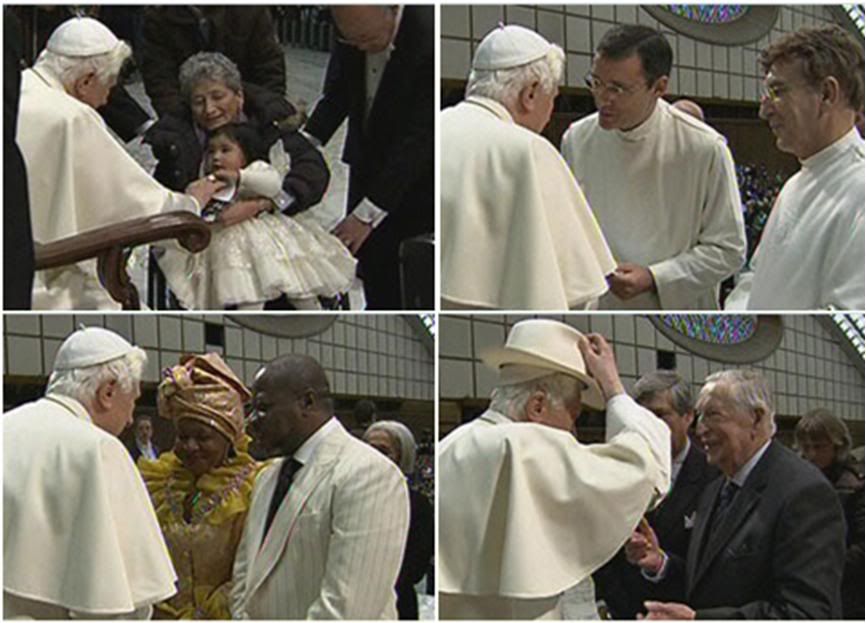
[Modificato da TERESA BENEDETTA 14/01/2010 00:07] |
| |
 14/01/2010 11:17 14/01/2010 11:17 |
|
| | | OFFLINE | | Post: 19.273
Post: 1.915 | Registrato il: 28/08/2005
Registrato il: 20/01/2009 | Administratore | Utente Veteran | |
|

 Thanks to Lella's blog
Thanks to Lella's blog
 for pointing out this article.
The strength of the Pope's words
for pointing out this article.
The strength of the Pope's words
lies in their truth and witness:
How Benedict XVI tackles issues
by Lucio Brunelli
Translated from

January 12, 2009
In both the Angelus on January 10 and his address yesterday to the Vatican diplomatic corps, the Pope called attention to the problem of clandestine immigrants and that of Christian minorities in the Muslim world.
They are diverse realities but Benedict XVI has chosen to bring them together in his messages. They are both situations of suffering, in which the same value is at stake: the acceptance of 'diversity'.
His words, especially those said at the Sunday Angelus, have found great and well-merited resonance in the mass media.
"We must start from the heart of the problem. We must start from the significance of the person," he said Sunday, commenting on the tragic events involving immigrant aliens in Rosarno [a town in southern Italy].
Even as concern for the Islamist 'invasion' of Europe is growing in many Catholic circles, Benedict XVI recalled some simple truths which should be familiar to anyone with a Christian sensibility.
The immigrant, though different from us in language, culture and origin, is a human being, who must be respected. Behind his face is a soul, a history, and "God loves him as he loves me". Words which are not rhetorical nor to be considered simply as an expression of obtuse Catholic do-goodism.
Analogously, speaking to the 178 ambassadors accredited to the Vatican, the Pope mentioned the tragedy of millions of persons constrained by war and by the scourges of poverty and hunger, to abandon the lands of their birth and ancestry.
"In the face of such an exodus," he said, "I call on civilian authorities to act with justice, solidarity, and foresight".
On both occasions, the Pope followed up these statements with "similar considerations" on the fate of Christians in some Muslim countries. Denouncing on Sunday the violences in Egypt and Malaysia and yesterday, the forced emigration of many Christians from the Middle East - also the result of a lack of religious freedom - the Pope nonetheless did not use the term 'reciprocity'.
And precisely, we think, because he does not wish to give the impression of any political give-and-take such as "We Catholics will defend the rights of Muslim immigrants in the West but only if you, in turn, grant our minorities equal treatment".
That is not the logic of Christianity, which has a logic of absolute gratuitousness. Benedict XVI framed the problem in terms of the respect that is owed to every person as a person - regardless of religious opinions and convictions, much less of skin color.
He said what he did not because he expects to gain some political profit in the dialog with Islam. But only because it is what he believes and feels.
And indeed, illegal immigrants are not subhuman beings who can be treated as the white masters treated black slaves in the cotton plantations of 19th-century USA.
Not to pay the laborer his right wages is one of the sins that cry out in the face of the Lord. This was not taught by Marx but by the catechism of our childhood, that of Pius X, that we learned by heart.
The strength of the Pope's words is in their evidence of truth. Not uttered in screams but with the gentle strength of witness.
Is it ingenuous to hope that such witness and such truth could - even if slowly - lead the Muslim world to open up their laws, but above all, the mentality of the people themselves to better respect for Christians?
Or is it perhaps more realistic, even in political terms, to simply take on a hostile attitude that is full of recrimination?
This Pope does not gloss over problems and inherently demands respect. But he is following a course that is new, and different from facile ecumenical irenisms and the equally facile and inconclusive attitude of closedness and revenge.
|
| |
 14/01/2010 12:41 14/01/2010 12:41 |
|
| | | OFFLINE | | Post: 19.274
Post: 1.916 | Registrato il: 28/08/2005
Registrato il: 20/01/2009 | Administratore | Utente Veteran | |
|
 Thursday, January 14
Servant of God JOHN THE GARDENER (b Portugal 15th-cent, d Spain 1501), Priest and Confessor
Thursday, January 14
Servant of God JOHN THE GARDENER (b Portugal 15th-cent, d Spain 1501), Priest and Confessor
Another saintly example from the Franciscan garden, John was born to a family in Portugal so poor
that he had to beg for his daily meals. He moved across the border to Spain where he found work
as a shepherd, during which he met two Franciscans who appreciated his simple spirituality. They
took him back to their monastery in Salamanca to tend the gardens, and he joined the order shortly,
where he became known for his life of prayer and helping the poor. He was called The Gardener
because of his work and the flowers he raised for the churches. He had the gift of prophecy and was
consulted by great men and princes of his day. It is said he predicted the day of his death.
NB: I cannot find any images online for today's saintly personage.
Readings for today's Mass: www.usccb.org/nab/today.shtml
OR today:
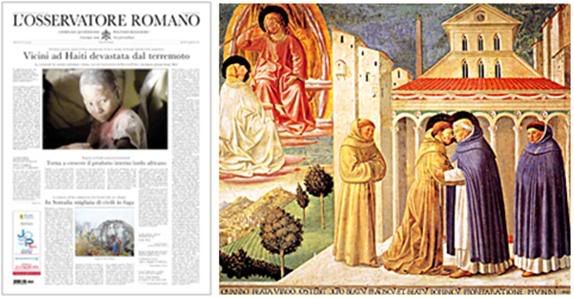 Illustration: Medieval painting of a meeting between Saints Francis and Dominic.
Illustration: Medieval painting of a meeting between Saints Francis and Dominic.
At the General Audience, Benedict's appeal for international aid to Haiti and expresses
'Spiritual closeness to the victims'
Port-au-Prince archbishop among the dead
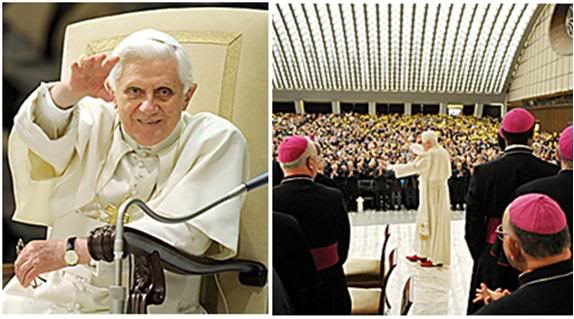 The Pope's appeal for Haiti came at the end of his Wednesday catechesis which was devoted to the
The Pope's appeal for Haiti came at the end of his Wednesday catechesis which was devoted to the
development of the Mendicant Orders (Franciscans and Dominicans) in the 13th century. Other P. 1
stories: The International Monetary Fund says Africa on the whole will have a 4% growth in GDP this
year; and the endless civil war in Somalia caused 110,000 Somalis last year to flee to neighboring
countries. Inside, a couple of stories about St. Paul as the feast of his conversion nears, with the
publication of a Codex Pauli by the Benedictine abbey at St. Paul outside the Walls, which puts
together all the Pauline texts and apocrypha in a special edition with spiritual, historical and artistic
commentary, a story about the custodians of the saint's tombs, and wartime stories of the refugees,
Jewish and others, who were given shelter in the Abbey during the war years. Also, an essay about
the 5th century sack of Rome as the basis for St. Augustine's City of God.
THE POPE'S DAY
The Holy Father today received the officials and administrative workers of the City of Rome
and the Region of Lazio in their traditional New Year's call on the Pope. Address in Italian.
First, the Pope met privately with
- Gianni Alemanno, Mayor of Rome
- Nicola Zingaretti, President of the Province of Rome
- Esterino Montino, Vice President of the Lazio region
[Modificato da TERESA BENEDETTA 15/01/2010 09:40] |
| |
 15/01/2010 10:11 15/01/2010 10:11 |
|
| | | OFFLINE | | Post: 19.275
Post: 1.917 | Registrato il: 28/08/2005
Registrato il: 20/01/2009 | Administratore | Utente Veteran | |
|
 With local and regional administrators:
With local and regional administrators:
Pope urges more government support
for families and young people

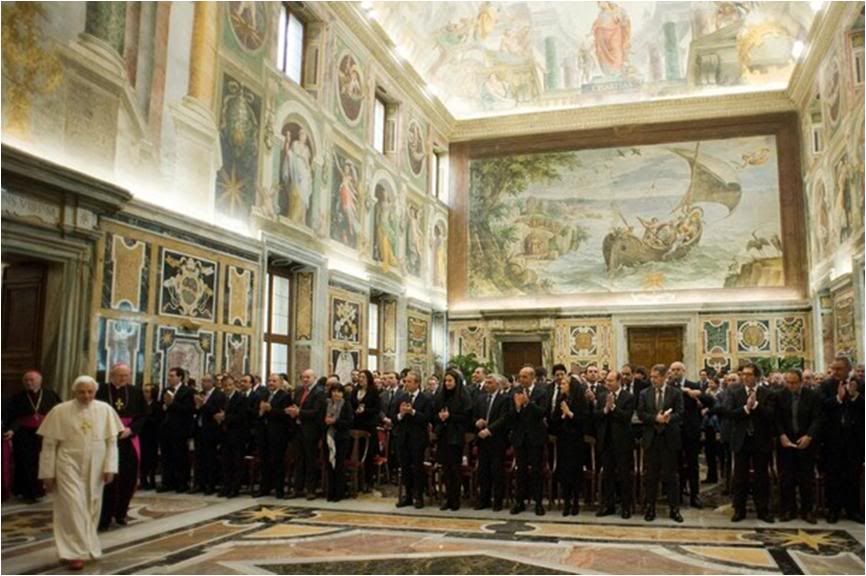
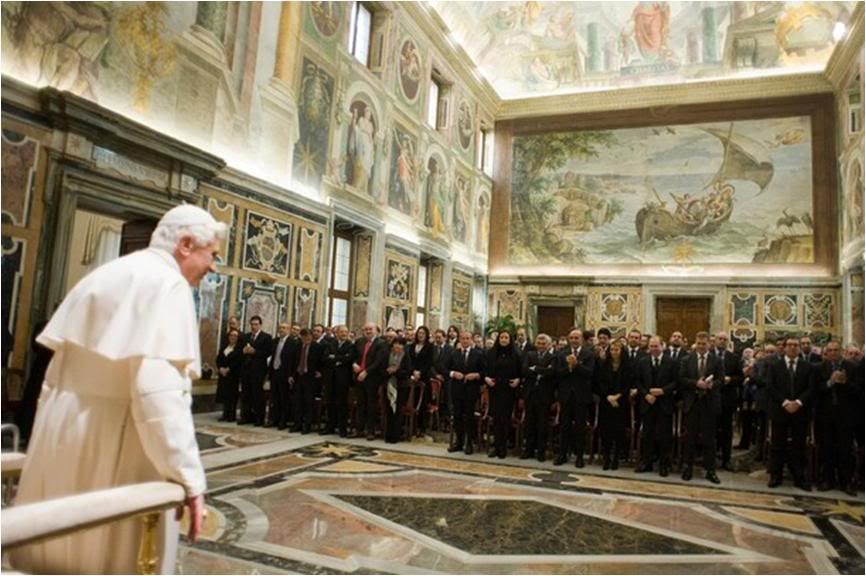
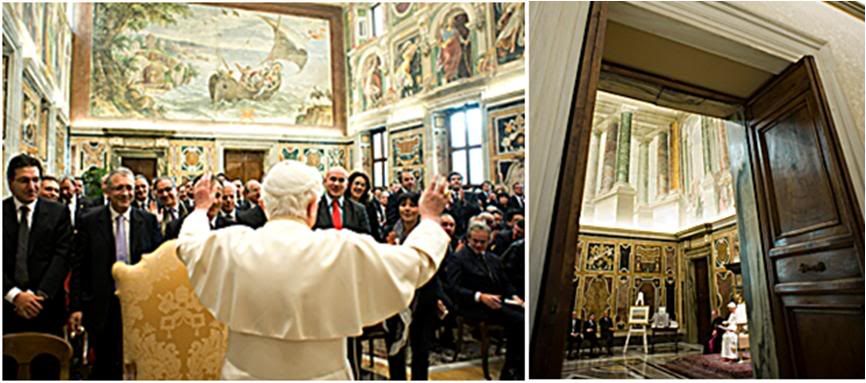
VATICAN CITY, 14 JAN 2010 (VIS) - This morning in the Vatican, the Pope received Gianni Alemanno, mayor of the City of Rome; Esterino Montino, vice president of the Region of Lazio, Italy, and Nicola Zingaretti, president of the Province of Rome, each accompanied by an entourage, for the traditional exchange of New Year greetings.
Opening his remarks to them, the Pope pointed out that heads of public institutions must "constantly pursue the common good", favouring "healthy debate, because the more decisions and measures are shared, the more they will bring real development to the inhabitants of the territory".
Going on to refer to urban development plans, the Holy Father highlighted how these "must favour the process of socialiZation, avoiding the emergence and growth of individualism and of exclusive concern for personal interests, which are harmful to human coexistence".
Benedict XVI expressed the hope that "in outlying areas as in the rest of the city", structures may be built "to help young parents in their educational duties. I likewise hope that further provisions may be made in support of families, especially large families, so that the entire city may benefit from the irreplaceable role of this institution, which is the first and indispensable cell of society.
"As part of the promotion of the common good, the education of the new generations ... is a predominant concern", the Pope added. In this context he indicated that "it is vital to help young people base their lives on authentic values, values that refer to an 'exalted' view of man which finds one of its most sublime expressions in Christian religious and cultural heritage".
"When educating on the great questions of affectivity and sexuality, which are so important for life, we must avoid showing adolescents and young people ways that tend to devalue these fundamental dimensions of human existence. To this end the Church calls for everyone to collaborate, especially those who work in schools, to educate the young to a lofty vision of human love and sexuality.
"Thus I invite everyone to understand that, in pronouncing her 'noes', the Church is really saying 'yes' to life, to love lived in the truth of the giving of self to the other, to the love that opens up to life and does not close itself in a narcissistic view of the couple".
Before concluding his address the Pope encouraged the competent authorities "to pay constant and coherent attention to the world of sickness and suffering. May the healthcare structures, which are so numerous in Rome and Lazio and which provide an important service to the community, administer the public weal with ever greater care, showing professional competency and generous dedication to the sick, the welcome and care of whom must be the supreme criterion for those who work in this field".
"I trust, then", he concluded, "that despite the persisting economic difficulties, these structures may receive adequate support for the valuable service they provide".
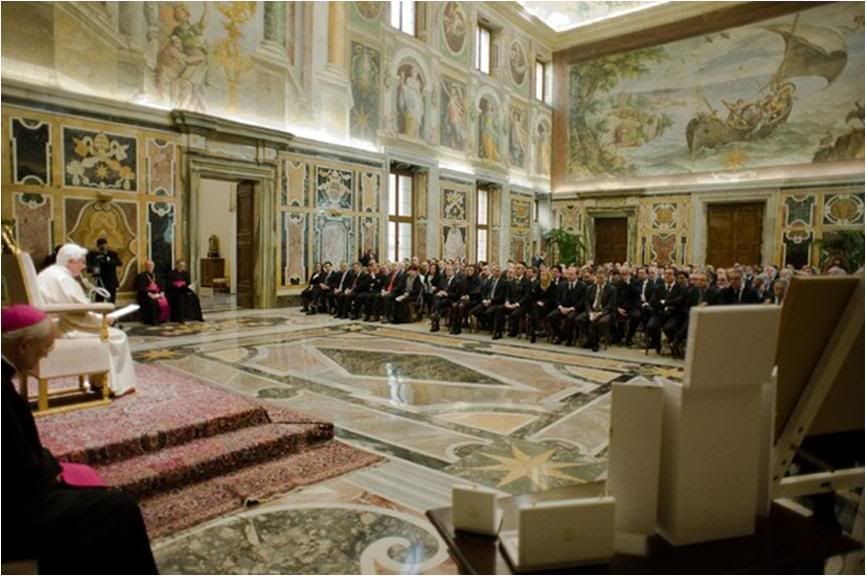
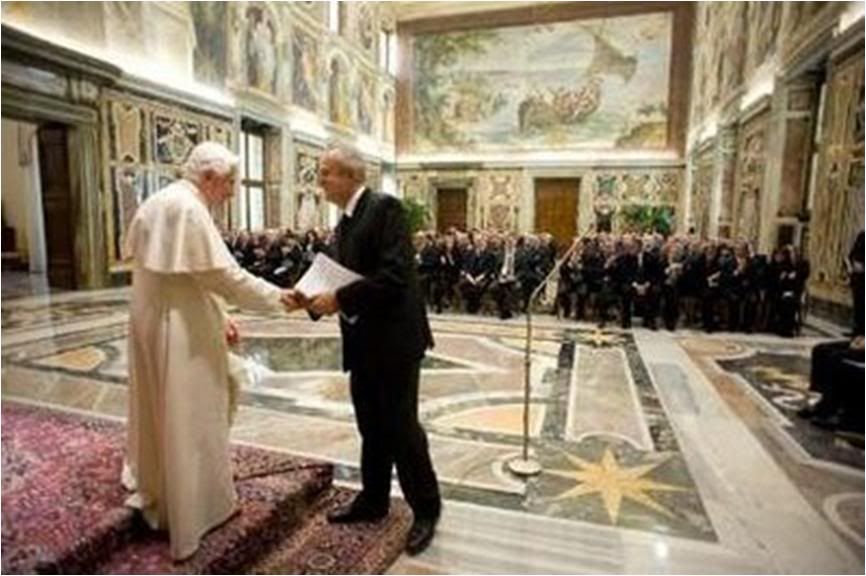
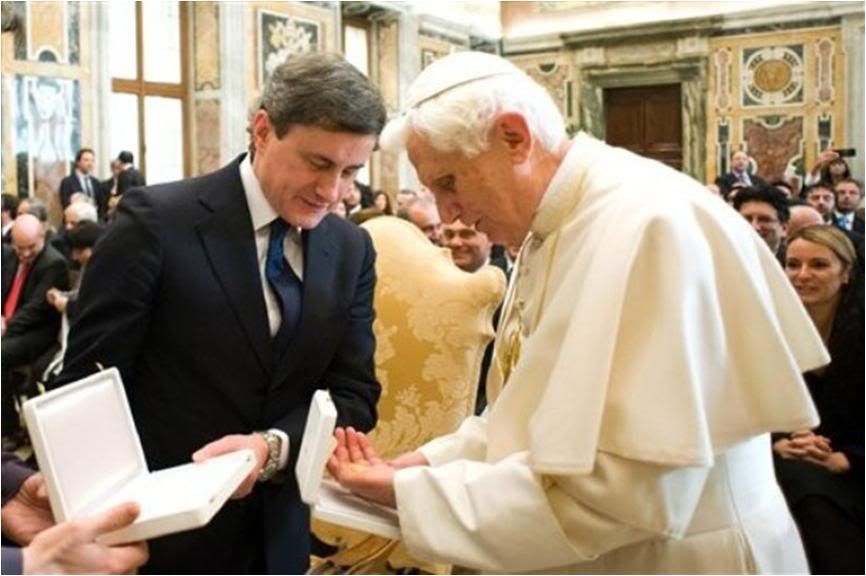 Here is a full translation of the Holy Father's address:
Here is a full translation of the Holy Father's address:
Distinguished ladies and gentlemen:
I am happy to meet you for this traditional appointment which offers us the opportunity to exchange greetings for the new year and to reflect on the reality in our land, in which for 2000 years the Successor of Peter has been present as Bishop oF Rome and metropolitan Archbishop of the Roman ecclesiastical province which covers the entire region of Lazio.
I am grateful for your visit and I address my deferential and cordial greeting to tHE Vice President of the Lazio Regional Council, the Hon. Esterino Montino; to the Mayor of Rome, Hon. Gianni Alemanno; and to the president of the Province of Rome, Hon. Nicola Zingaretti, whom I thank for the courteous words they addressed to me in the name of the administrations that they lead. With them, I greet the presidents of the respective Council Assemblies who are present.
As they pointed out, the crisis which has involved the entire global economy has had consequences for the residents and businesses in Rome and Lazio. At the same time, it has offered the possibility to rethink the model of growth that has been followed in these past years.
In the encyclical Caritas in veritate, I pointed out that in order to be authentic, human development must consider man in his totality and must be realized in charity and in truth.
The human being, in fact, must be at the center of political action, and must be the first concern for those who are called to administer the civilian community.
It is fundamental that those who have been entrusted by the citizenry with the high responsibility of governing their institutions be aware of the priority demand to constantly pursue the common good, which is "not a good sought for itself, but for the persons who form part of the social community and who only in that community can truly and more effectively achieve their wellbeing" (Caritas in veritate, 7).
In order that this may happen, it is necessary that institutions look to favor a healthy dialectic such that the more decisions and provisions are shared, the more they will allow effective development for the residents of the territories they administer.
In this context, I wish to express my appreciation for the efforts by these administrations to attend to the weakest and most emarginated layers of society with a view to promoting a more just and fraternal coexistence.
Accordingly, I wish to invite you to be attentive that the centrality of the human being and the family constitutes the principle that inspires your every choice.
In particular, to pay attention to the development of new settlements in the cities in order that the housing complexes that are rising are not simply dormitory neighborhoods.
To this end, it is necessary to plan structures that favor the processes of socialization, avoiding the emergence and growth of closure into individualism and exclusive attention to one's own interests which are damaging to human coexistence.
Respecting the competence and jurisdiction of civilian authorities, the Church is happy to offer its own contribution so that these neighborhoods may have a social life worthy of man. I know that in many suburban zones, this has already happened, thanks to the efforts of the communal administration in realizing important works, and I hope that such demands will be taken into consideration where necessary.
I am thankful for the consolidated collaboration that exists among the administrations that you lead and the Vicariate, in particular, in the construction of new parochial complexes, which besides being reference points for Christian life, also carry out a fundamental educational and social function.
Such collaboration has allowed the achievement of some significant objectives. In this respect, I am happy to point out that in certain new neighborhoods, where, in particular, young families with small children live, the ecclesial communities, aware that openness to life is at the center of true human development (cfr Ibid.,28), have opened 'oratories for children'.
These useful structures serve as day care centers for children while their parents are at work. I am confident that an ever more fruitful synergy between various institutions will allow the emergence in the suburbs, as in the rest of the city, of analogous structures that will also help young parents to carry out their educational tasks.
I hope that more provisions may be adopted in favor of families, especially those with many children, so that the entire city may gain from the irreplaceable function of this fundamental institution, which is the first and indispensable cell of society.
In the context of promoting the common good, education of the new generations, who constitute the future of our region, represents the predominant concern that administrators of the public good share with the Church and with all formative organizations.
For some years, the Diocese of Rome and those of Lazio have been engaged in offering their contributions to meet the ever more urgent demands of young people which require adequate and high-profile educational responses.
The necessity and urgency of helping the youth to plan their lives on the basis of authentic values are evident to everyone - values that refer to a 'high' standard of man and which find their most sublime expression in the Christian religious and cultural patrimony.
Today the new generations want to know what is man and what is his destiny - they seek answers that can show them the way to follow in order to found their existence on perennial values.
In particular, in formative efforts on the great issues of affective relations and sexuality - so important in life - one must avoid exposing adolescents and young people to ways that favor the banalization of these fundamental dimensions of human existence.
To this end, the Church says Yes to life, to love lived in the truth of giving oneself to the other, to love which is open to life and is not closed within a narcissistic view of the married couple.
She is convinced that only such choices can lead to a model of life in which happiness is a shared good. On these themes, as well as on those of the family founded on matrimony, and on respect for life from conception to its natural end, the ecclesial community cannot but be faithful to the truth that "alone can guarantee freedom and the possibility of integral human development" (Ibid.,9).
Finally, I cannot fail to exhort the competent authorities to paying constant and consistent attention to the world of the sick and the suffering.
May the health care structures, which are quite numerous in Rome and in Lazio, and which offer an important service to the community, be places in which there is always attentive and responsible management of the public good, professional competence and generous dedication towards patients, whose reception and care should be the supreme criterion of those who work in this field.
Rome and Lazio, with their structures for public health, have known for centuries the presence of similar structures of Catholic inspiration which work in favor of broad sectors of the population.
In these institutions, it is sought to join professional competence and care of the sick with the truth and the charity of Christ. Indeed, inspired by the Gospel, their goal is to accompany suffering persons with love and hope, sustaining even their search for meaning, and seeking to answer the questions that inevitably arise in the hearts of those who have to live with sickness and pain.
Indeed, man must be healed in the unity of his spiritual and physical being. I trust, therefore, that notwithstanding persistent economic difficulties, such structures can be adequately sustained in their valuable service.
Respected authorities, as I express my sincere gratitude for your courteous adn welcome visit, I assure you of my cordial nearness and prayers for you, for the high responsibilities that are entrusted to you, and for the residents of the territories that you administer.
May the Lord sustain and guide you, and grant the fulfillment of those expectations for good that are present in the heart of everyone. With such sentiments, and with affection and good will, I impart the Apostolic Blessing, extending it to your families and those who live and work in Rome, its province and all of Lazio.
Before he addressed the delegations gathered together, the Holy Father met individually in private audiences with Alemanno, Montino and Zingaretti.
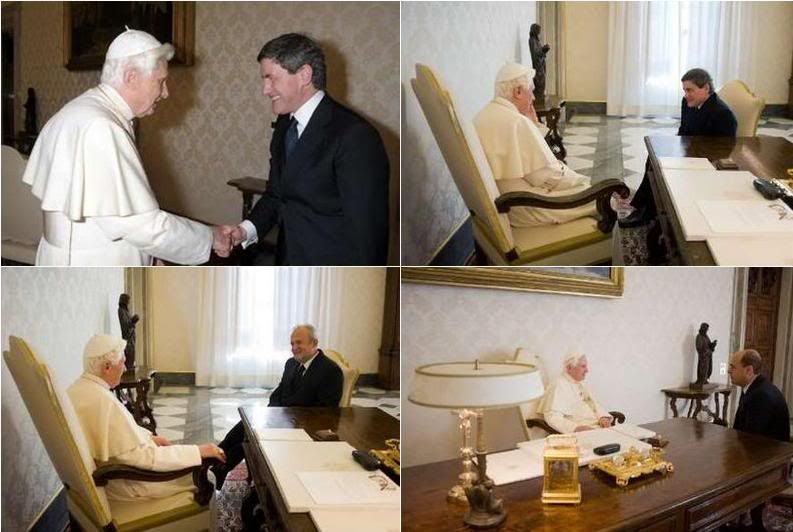
[Modificato da TERESA BENEDETTA 16/01/2010 13:16] |
| |
 15/01/2010 12:17 15/01/2010 12:17 |
|
| | | OFFLINE | | Post: 19.276
Post: 1.918 | Registrato il: 28/08/2005
Registrato il: 20/01/2009 | Administratore | Utente Veteran | |
|

 On her excellent site, Beatrice calls attention to a couple more French commentaries by writers well-disposed towards the Pope. I've translated first this one by La Croix's fairly new correspondent in Rome, who has since given us quite a few good reports.
On her excellent site, Beatrice calls attention to a couple more French commentaries by writers well-disposed towards the Pope. I've translated first this one by La Croix's fairly new correspondent in Rome, who has since given us quite a few good reports.
I am puzzled by his title, 'Le Pape sans passion?' [which translates either as 'The Pope without passion?' or 'The dispassionate Pope?', but I think the latter carries the sense better and is more idiomatic], since the blog turns out to be about something else - he starts out disputing a black-or-white view of Benedict XVI but ends up scrutinizing how Italian media report on the Pope and the Vatican, without getting back to his premise!
P.S. Flo has since called my attention to the correct sense of Mounier's title, in which case my comment above does not apply. I am revising my translation of the title accordingly.
Discussing the Pope dispassionately
by Frederic Mounier
Translated from his blog


January 9, 2010
I am struck, from Rome, by the cutting and definitive – even passionate – judgments taken by those in France about Benedict XVI. Our Cartesian minds are conveniently incapable of nuancing – and so the Pope is seen either as an almost-fundamentalist, or as a near-saint.
In both cases, the complexity of history, culture, politics, theology and sociology is not taken into account. And whoever is talking to someone who has such a judgment – often a priori and unappealable – is often compelled to share his view. And that is what I find concerning as much for the quality of our intelligence as for that of our faith.
In order to get out of such territory, obviously full of snares, I would like you to take a brief look at the Italian media.
In religious matters, they are very different from us. They consider the Vatican as a stage – a theatrical stage, for political theater, and a subject to analyze like any place that calls forth all sorts of analyses – with respect, certainly [NOT ALWAYS - and the 'exceptions' are often absolutely disgraceful if not disgusting]], but also without taboos, using criteria that are often unknown to us.
For instance, at the moment, the speculation is focused on a coming consistory – the meeting of cardinals from around the world at which the Pope formally announces the names of those who have been chosen to be raised top this supreme honor of the Church. And who will also elect his successor. Let us see how important the stakes are.
There are two thoughts at the moment on the date for such a consistory: June 28 or October 17 (to coincide with the beatification of John Paul II). Many Italian names are being circulated. Among them, those whose current positions in the Roman Curia usually come with the cardinal’s red hat, and those who have been chosen to head important dioceses. Then, the main unknown: those that the Pope chooses personally. And so the corridors are humming in the Vatican…
The Italian media also love to scrutinize – sometimes with scalpel-like cuts – the nominations and decisions emanating from the Vatican. They all recall the ‘Polish clique’ that , in their view, had ‘corrupted’ the administration of the Church in John Paul II’s time,
Today, the same observers are focusing on the ‘Salesian clan’. The sons of Don Bosco are among the most represented today in the higher ranks of the Roman Curia, starting with the Vatican Secretary of State, Cardinal Tarcisio Bertone. To the point that some malicious souls (yes, they have them too!) [of course they do!] have said the Salesian suffix SDB (for Salesians of Don Bosco) has come to mean ‘siamo di Bertone’ (We’re Bertone’s boys).
The Salesians are also called ‘the most important lobby in the Church today – much more than Opus Dei’.
But these observers also underscore more generally that the presence of the religious orders (Jesuits, Dominicans, Franciscans, Lazarists, Scalabrians, etc) has grown in the Vatican to the detriment of diocesan clergy. [Why should it be? Diocesan clergy are meant to be direct pastors in local parishes, while the religious orders are trained for other purposes, from missionary work in remote lands to special apostolates in education, cultural promotion or various aspects of active charity. Assignment to the Roman Curia is one such apostolate - whtether the assignee is diocesan or religious - and it should be considered as such, starting with the prelates themselves.]
“The Roman Curia is a perpetually evolving court”, says one of my Italian colleagues... [And there's an analogy often favored by Varican reporters - of looking at the Papacy as an ancien regime royal court, with the Curia as courtiers and jokers fawning and plotting before the Pope!]
In any case, on this side of the Alps, the words are often harsh. A weekly evoked the situation in the Vatican with these words: “The Pope writes, Bertone improvises, and the Church is leaderless”, while citing this rising star, that falling one, or some decision strongly disputed in the very heart of the Apostolic Palace. [In which such writers treat the Vatican like a secular state and its leaders like secular politicians – an attitude that actively politicizes the Church by identifying her and the Catholic hierarchy with their administrative structures, thus constantly ignoring and undermining their primarily spiritual mission and nature.]
The atmosphere is certainly not Florentine in the Medici sense, but as St. Francis of Sales (patron of journalists) said, “Where man is, there will be human acts!” And everyone knows that at the Vatican, there are men whose task it is to guide the boat that is the Church.
And so, we, being human, analyze what they do as humans.
The second item from Beatrice is something she picked up from an online exchange between
 and Guillaume de Thieulloy, who writes a blog cleverly entitled
and Guillaume de Thieulloy, who writes a blog cleverly entitled.
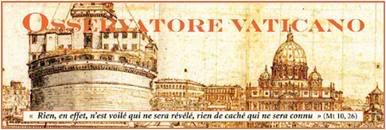 De Thieulloy. 36, holds a doctorate in political science and a master's degree
De Thieulloy. 36, holds a doctorate in political science and a master's degree
in thelogy, is the editor of Les 4 Verites hebdo, a weekly magazine
described as 'the journal of the liberal right'.
Beatrice spares us the trouble of going through the exchange with a brief introduction:
This is what I take from it (the exchange):
A reader asked de Thieulloy: In your opinion, do recent actions by Benedict XVI (lifting the Lefebvrian bishops' excommunication, dialogue with the FSSPX, greater attention to liturgical matters, providing a framework for inter-religious dialog) have an influence on society and on the world in general? Will our societies recover to the degree that the Church itself recovers?
And here is his superb response. In fact, he has grasped that Benedict XVI has restored to us, by his own person - and without taking anything from Catholicism's claim to unversality as its very name means - the pride of being European.
I am not a prophet and therefore, have no competence to answer your question. But I think that the actions of Benedict XVI - and even more simply, his very way of being - have a great cultural importance.
And this is true on several levels:
1) First, Benedict XVI is one of the last Europeans, to the degree that he - unlike our so-called elites - feels the vibrance, if I can say so, when he looks at the Sixtine Chapel, when he listens to Mozart or Palestrina, when he reads Dante, Boetius or Bernanos.
2) If he succeeds in managing his projects for unity (within the Church, first, and also with the Anglo-Catholics and the Orthodox Christians], he will give the Church a new strength for evangelization. Of course, the Catholic Church as it now is has all the necessary powers for evangelization, but humanly speaking, those powers would be vastly enriched.
3) As a journalist, I am most struck by what I think to be a decisive attitude in Benedict XVI: his perfect indifference to the mediatic hubbub.
And I think that, sooner or later, the true political elites, whom we need in order to remake Europe, will learn his lesson: that so-called public opinion is nothing but a veneer that one need only ignore in order to deprive it of any power.
But how long will it take for them to learn? I must say I cannot say.
[Modificato da TERESA BENEDETTA 15/01/2010 16:02] |
| |
 15/01/2010 13:59 15/01/2010 13:59 |
|
| | | OFFLINE | | Post: 19.277
Post: 1.919 | Registrato il: 28/08/2005
Registrato il: 20/01/2009 | Administratore | Utente Veteran | |
|
 The Pope offers an approach
The Pope offers an approach
for dealing with immigrants
by Bruno Mastroianni
Translated from

One must begin at the heart of the problem. One must begin with the meaning of the person. An immigrant is a human being - different in origin, culture and traditions, but a person to be respected, with rights and duties, especially in the area of employment, where the temptation to exploit them is easy, but also in their concrete living conditions.
Violence should never be - for anyone - the way to resolve difficulties. The problem is human above all! I call on everyone to look at the face of the other and to discover that he has a soul, a history and a life - he is a person, and God loves him as he loves me.
- Benedict XVI, Angelus, 1/10/2010
The Pope's appeal on behalf of immigrants last Sunday was not a defense of immigrant status as such nor a generic condemnation of violence.
It was a direct challenge to a problem that has afflicted more advanced societies for some time: the addiction to 'current events'.
The ability to follow information in the continuous evolution of every news event has given rise to a widespread habit to consider every issue in the same way, convinced that an appropriate prescription can be applied to every problem as it arises.
It has become like a game of tennis in which every hit by the opponent (the problem) must be met with an equal but opposite reaction (the solution).
It is a risk that is continually present: it gives the illusion that one is up-to-date and vigilant, but in the long run, it can and does diminish the ability to place things in the right perspective, leading to obtuse and ineffectual responses.
That is why the Pope, at last Sunday's Angelus, in a few simple words, called for a return to the 'heart' of the (immigration) problem.
Immigration is a serious matter, leading to problems that were neither born in Rosarno [town in southern Italy where local gangs beat up on immigrant farm workers] nor end there.
Nor can it be reduced - as it is all the time - by the mediatic juxtaposition of the inconvenience to the host natives (which demands rigorous protections by the law) and the pitiful conditions of the 'guests' (which arouse brotherly sentiments of solidarity).
Immigration requires a far more demanding effort: "One must begin from the meaning of the person", the Pope reminds us.
And that is not a charitable line to soften the harshness of the situation. It is a call to the West [as the object of unprecedented migrations in recent times] to rediscover that which in the past made it rise to the level of the most demanding challenges.
[Modificato da TERESA BENEDETTA 15/01/2010 14:00] |
| |
 15/01/2010 14:44 15/01/2010 14:44 |
|
| | | OFFLINE | Post: 194
Post: 1 | Registrato il: 21/10/2008
Registrato il: 03/09/2009 | Utente Comunità | Utente Junior | |
|
[IMG]http://i601.photobucket.com/albums/tt96/MARITER_7/BANNERS-
I am puzzled by his title, 'Le Pape sans passion?' [which translates either as 'The Pope without passion?' or 'The dispassionate Pope?', but I think the latter carries the sense better and is more idiomatic], since the blog turns out to be about something else - he starts out disputing a black-or-white view of Benedict XVI but ends up scrutinizing how Italian media report on the Pope and the Vatican, without getting back to his premise!
Hi Teresa
I read the article. The title is hard to translate. Here the meaning is
Could we talk about the pope without passion !
 Dear Flo -
Dear Flo -
Of course, you are right! At 3 o'clock in the morning, when I translated it, I was stuck in a one-track thinking mode with the Pope as the subject rather than the object! Of course, that is the sense of the title, and I will make the necessary change to 'Discussing the Pope dispassionately', allowing for an alliterative opportunity!
Thank you!
TERESA
[Modificato da TERESA BENEDETTA 15/01/2010 16:54] |
| |
 15/01/2010 15:52 15/01/2010 15:52 |
|
| | | OFFLINE | | Post: 19.278
Post: 1.920 | Registrato il: 28/08/2005
Registrato il: 20/01/2009 | Administratore | Utente Veteran | |
|
 Friday, January 15
Friday, January 15
 Center illustration: St. Anthony Abbot burying St Paul the Hermit.
ST. PAUL THE HERMIT (Paul of Thebes)(Egypt, 228-345)
Center illustration: St. Anthony Abbot burying St Paul the Hermit.
ST. PAUL THE HERMIT (Paul of Thebes)(Egypt, 228-345)
Considered to be the first Christian hermit, Paul was in his 20s when he escaped the Christian
persecution under Emperor Dacian by fleeing to a cave in the desert outside Thebes. He found
the solitude and opportunity for prayer so right for him that he stayed for the next 90 years.
He subsisted on a nearby spring and palm tree, though it was said that when he was 43, a raven
started bringing him half a loaf of bread every day. When he was 112, he received a visit from
St. Anthony Abbot (Anthony the Great), already renowned as a pioneer of ascetic monasticism
and who had himself lived as a desert anchorite. It is said they spent a day and a night talking
to each other. Paul lived another year and died at age 113. St. Jerome wrote a biography which
has become the standard source about him.
[GReadings for today's Mass: www.usccb.org/nab/readings/011610.shtml
OR today.
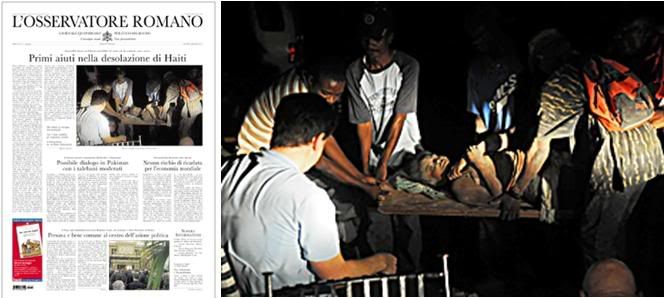 The newspaper leads off with a wrap-up on the unprecedented earthquake disaster in Haiti and international assistance,
The newspaper leads off with a wrap-up on the unprecedented earthquake disaster in Haiti and international assistance,
with separate articles on the losses to the Church (at least a hundred priests and religious confirmed dead); the
mobilization of Cor Unum, Caritas International and other Catholic organizations, and a backgrounder on that chronically
troubled country, the poorest in the Western hemisphere.
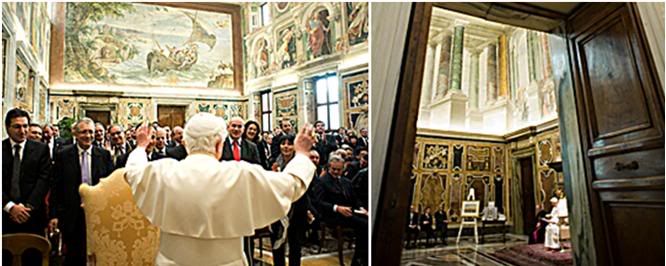
The papal story is the Pope's address to the city, provincial and regional administrators of Rome and Lazio, reminding
them that the human being and the common good must be the center of all political actions, Other Page 1 stories:
US special envoy in Pakistan seeks dialog with Taliban moderates; and the director of the International Monetary
Fund says he sees no danger that the world will revert to economic crisis.
THE POPE'S DAY
The Holy Father met today with
- Cardinal Christoph Schönborn, Archbishop of Vienna
- Mons. Jean-Pierre Cattenoz, Archbishop of Avignon (France)
- Mons. Gerhard Ludwig Müller, Bishop of Regensburg
- Dom Philippe Dupont, O.S.B., Abbbot of St. Pierre Abbey, Solesmes (France)
- Participants in the Plenary Assembly of the Congregation for the Doctrine of the Faith. Address in Italian.
The Office of Pontifical Liturgical Celebrations has released the calendar of liturgical events presided
over by the Holy Father in Frbruary to April 2010.
[Modificato da TERESA BENEDETTA 16/01/2010 07:25] |
| |
|
|
|
|